 Original Broadway Cast, 1960 (RCA/DRG)
Original Broadway Cast, 1960 (RCA/DRG)  (4 / 5) Composer-lyricist Frank Loesser was determined never to repeat himself in his musicals. In between his operatic The Most Happy Fella and his satirical How to Succeed in Business Without Really Trying, he created a bucolic, whimsical score for a show set in the village of Greenwillow — -perhaps located a few miles due east of the equally mythical Brigadoon. The show seemed to perplex and confuse people, its charms eluding both critics and audiences. As a result, it lingered on Broadway for just under 100 performances. We should be grateful that it opened at a time when most Broadway musicals were recorded on the first Sunday after opening, before it was known if the show would have a successful run. The album begins with church chimes and then, after a lovely prelude, moves into the syncopated opening number “A Day Borrowed From Heaven.” This sequence introduces the villagers and, eventually, the central character Gideon Briggs, played by Anthony Perkins in his first and last Broadway musical. His is not a legit musical theater voice but, having made some pop albums for RCA prior to Greenwillow, Perkins was quite secure in his singing. He combines that talent with powerful acting to excellent effect in the ebullient “Summertime Love” and the dramatic “Never Will I Marry.” Pert Kelton and Lee Cass practically steal the recording with the uproarious “Could Have Been a Ring,” in which they sing about the relationship they never had with each other. The ingenue, Ellen McCown, sounds fine in the haunting ballads “Walking Away Whistling” and “Faraway Boy,” while Cecil Kellaway and William Chapman do fine work as two very different clergymen. There is also a Frank Loesser Christmas Carol (“Greenwillow Christmas”) and a glorious song celebrating “The Music of Home.” One can forgive the occasional clunkers (such as “Clang Dang the Bell,” in which a cow gets baptized) because they are surrounded by so much good material from one of Broadway’s greatest composer-lyricists. This is a recording you are likely to love. — Jeffrey Dunn
(4 / 5) Composer-lyricist Frank Loesser was determined never to repeat himself in his musicals. In between his operatic The Most Happy Fella and his satirical How to Succeed in Business Without Really Trying, he created a bucolic, whimsical score for a show set in the village of Greenwillow — -perhaps located a few miles due east of the equally mythical Brigadoon. The show seemed to perplex and confuse people, its charms eluding both critics and audiences. As a result, it lingered on Broadway for just under 100 performances. We should be grateful that it opened at a time when most Broadway musicals were recorded on the first Sunday after opening, before it was known if the show would have a successful run. The album begins with church chimes and then, after a lovely prelude, moves into the syncopated opening number “A Day Borrowed From Heaven.” This sequence introduces the villagers and, eventually, the central character Gideon Briggs, played by Anthony Perkins in his first and last Broadway musical. His is not a legit musical theater voice but, having made some pop albums for RCA prior to Greenwillow, Perkins was quite secure in his singing. He combines that talent with powerful acting to excellent effect in the ebullient “Summertime Love” and the dramatic “Never Will I Marry.” Pert Kelton and Lee Cass practically steal the recording with the uproarious “Could Have Been a Ring,” in which they sing about the relationship they never had with each other. The ingenue, Ellen McCown, sounds fine in the haunting ballads “Walking Away Whistling” and “Faraway Boy,” while Cecil Kellaway and William Chapman do fine work as two very different clergymen. There is also a Frank Loesser Christmas Carol (“Greenwillow Christmas”) and a glorious song celebrating “The Music of Home.” One can forgive the occasional clunkers (such as “Clang Dang the Bell,” in which a cow gets baptized) because they are surrounded by so much good material from one of Broadway’s greatest composer-lyricists. This is a recording you are likely to love. — Jeffrey Dunn
Category Archives: G-I
Grease
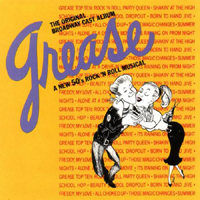 Original Broadway Cast, 1972 (MGM/Polydor)
Original Broadway Cast, 1972 (MGM/Polydor)  (4 / 5) Those who know Grease only from its inexplicably popular, sophomoric film version or the pumped-up, wrongheaded 1994 Broadway revisal will be surprised the first time they hear this album. As first seen Off-Broadway and then on Broadway after a run in Chicago, the show was an affectionate little musical about the teenage lifestyle of the late 1950s — when rock and roll was aborning, the cool boys sported heavily gelled hair and motorcycle jackets, and their girls favored beehive hairdos and pedal pushers. The original Broadway production was the long-run champ for a time, racking up 3,338 performances before it closed in 1980. With book, music, and lyrics by Jim Jacobs and Warren Casey, Grease skillfully walks the line between parody and hommage. The melodies, rhythms, harmonies, and arrangements of the songs are clever knockoffs of popular ’50s hits, very catchy and buoyed by some clever lyrics. (Example, from “Freddy, My Love”: “I treasure every giftie / The ring was really nifty / You said it cost you fifty / So you’re thrifty / I don’t mind.”) Other highlights include “Summer Nights,” which amusingly presents a boy’s and a girl’s different descriptions of their summer romance; the infectious “Magic Changes,” sung by a kid who’s thrown himself wholeheartedly into guitar lessons; “It’s Raining on Prom Night,” an oddly touching, funny lament over a lost high-school love (sample lyric: “I don’t even have my corsage, oh gee / It fell down a sewer with my sister’s I.D.”); and “We Go Together,” a bouncy anthem of teenage unity. The score does contain one serious number, and it’s a good one: “There Are Worse Things I Could Do,” sung by Rizzo, whose outward toughness masks her vulnerability. Adrienne Barbeau gives the song a moving, well sung performance. Barry Bostwick is terrific as lead greaser Danny, and Carole Demas sounds just right as Danny’s sweet girlfriend, Sandy. Among the other standouts in the cast are Katie Hanley, Walter Bobbie, and Kathi Moss. — Michael Portantiere
(4 / 5) Those who know Grease only from its inexplicably popular, sophomoric film version or the pumped-up, wrongheaded 1994 Broadway revisal will be surprised the first time they hear this album. As first seen Off-Broadway and then on Broadway after a run in Chicago, the show was an affectionate little musical about the teenage lifestyle of the late 1950s — when rock and roll was aborning, the cool boys sported heavily gelled hair and motorcycle jackets, and their girls favored beehive hairdos and pedal pushers. The original Broadway production was the long-run champ for a time, racking up 3,338 performances before it closed in 1980. With book, music, and lyrics by Jim Jacobs and Warren Casey, Grease skillfully walks the line between parody and hommage. The melodies, rhythms, harmonies, and arrangements of the songs are clever knockoffs of popular ’50s hits, very catchy and buoyed by some clever lyrics. (Example, from “Freddy, My Love”: “I treasure every giftie / The ring was really nifty / You said it cost you fifty / So you’re thrifty / I don’t mind.”) Other highlights include “Summer Nights,” which amusingly presents a boy’s and a girl’s different descriptions of their summer romance; the infectious “Magic Changes,” sung by a kid who’s thrown himself wholeheartedly into guitar lessons; “It’s Raining on Prom Night,” an oddly touching, funny lament over a lost high-school love (sample lyric: “I don’t even have my corsage, oh gee / It fell down a sewer with my sister’s I.D.”); and “We Go Together,” a bouncy anthem of teenage unity. The score does contain one serious number, and it’s a good one: “There Are Worse Things I Could Do,” sung by Rizzo, whose outward toughness masks her vulnerability. Adrienne Barbeau gives the song a moving, well sung performance. Barry Bostwick is terrific as lead greaser Danny, and Carole Demas sounds just right as Danny’s sweet girlfriend, Sandy. Among the other standouts in the cast are Katie Hanley, Walter Bobbie, and Kathi Moss. — Michael Portantiere
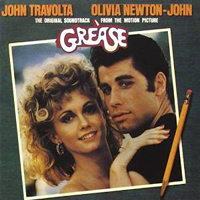 Film Soundtrack, 1978 (Polydor)
Film Soundtrack, 1978 (Polydor)  (1 / 5) The first cut on this album, a new title song (there was none in the stage show), cues you into the silly, anachronistic style of the film version of Grease. It’s a disco number, of all things, written by Barry Gibb of the Bee Gees and sung by Frankie Valli. (Although Grease is set in the late 1950s, director Randal Kleiser and colleagues apparently thought it necessary to add a disco song to the score, simply because that type of music was so popular when the film was made.) Other additions to the song stack aren’t as objectionable. Louis St. Louis wrote “Sandy,” a new lost-love song for Danny (John Travolta) that’s okay but not as much fun as “Alone at a Drive-In Movie,” the Jacobs-Casey song it replaced. John Farrar contributed “Hopelessly Devoted to You,” a pretty ballad for Sandy (Olivia Newton-John); and “You’re the One That I Want,” a Sandy-Danny duet that’s catchy but also sounds out of period despite the “oo-oo-oos” in the chorus. In Rizzo’s songs, Stockard Channing resorts to vocal mugging and over-inflection; it seems she has a fine singing voice, but doesn’t trust it. On the other hand, a plus for both the movie and the album is Frankie Avalon’s performance of “Beauty School Dropout.” Note that “Greased Lightnin'” is led here by Danny rather than Kenickie, presumably to give Travolta another showcase song. Also note that some numbers in the show score, such as “Those Magic Changes” and “It’s Raining on Prom Night,” are performed on the soundtrack album by various artists but aren’t actually included in the film, or are heard only as background music. — M.P.
(1 / 5) The first cut on this album, a new title song (there was none in the stage show), cues you into the silly, anachronistic style of the film version of Grease. It’s a disco number, of all things, written by Barry Gibb of the Bee Gees and sung by Frankie Valli. (Although Grease is set in the late 1950s, director Randal Kleiser and colleagues apparently thought it necessary to add a disco song to the score, simply because that type of music was so popular when the film was made.) Other additions to the song stack aren’t as objectionable. Louis St. Louis wrote “Sandy,” a new lost-love song for Danny (John Travolta) that’s okay but not as much fun as “Alone at a Drive-In Movie,” the Jacobs-Casey song it replaced. John Farrar contributed “Hopelessly Devoted to You,” a pretty ballad for Sandy (Olivia Newton-John); and “You’re the One That I Want,” a Sandy-Danny duet that’s catchy but also sounds out of period despite the “oo-oo-oos” in the chorus. In Rizzo’s songs, Stockard Channing resorts to vocal mugging and over-inflection; it seems she has a fine singing voice, but doesn’t trust it. On the other hand, a plus for both the movie and the album is Frankie Avalon’s performance of “Beauty School Dropout.” Note that “Greased Lightnin'” is led here by Danny rather than Kenickie, presumably to give Travolta another showcase song. Also note that some numbers in the show score, such as “Those Magic Changes” and “It’s Raining on Prom Night,” are performed on the soundtrack album by various artists but aren’t actually included in the film, or are heard only as background music. — M.P.
 Original London Cast, 1993 (Epic)
Original London Cast, 1993 (Epic)  (2 / 5) Producer Robert Stigwood interpolated the songs that were written expressly for the Grease film into his London staging of the musical. The anachronistic title number, sung here by the full company, still rankles, but other, more innocuous songs from the movie are well performed. Deborah Gibson is perfect for the role of Sandy, and Craig McLachlan is right-on as Danny. As Rizzo, Sally Ann Triplett overplays “Look at Me, I’m Sandra Dee” (and mispronounces Troy Donahue’s last name) but does a fine job with “There Are Worse Things I Could Do.” Charlotte Avery offers a regrettable Marilyn Monroe impersonation in “Freddy, My Love.” Of the others, Shane Richie’s Kenickie and John Combe’s Doody are especially commendable. — M.P.
(2 / 5) Producer Robert Stigwood interpolated the songs that were written expressly for the Grease film into his London staging of the musical. The anachronistic title number, sung here by the full company, still rankles, but other, more innocuous songs from the movie are well performed. Deborah Gibson is perfect for the role of Sandy, and Craig McLachlan is right-on as Danny. As Rizzo, Sally Ann Triplett overplays “Look at Me, I’m Sandra Dee” (and mispronounces Troy Donahue’s last name) but does a fine job with “There Are Worse Things I Could Do.” Charlotte Avery offers a regrettable Marilyn Monroe impersonation in “Freddy, My Love.” Of the others, Shane Richie’s Kenickie and John Combe’s Doody are especially commendable. — M.P.
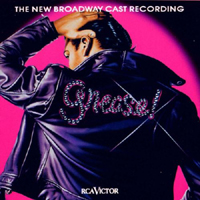 Broadway Cast, 1994 (RCA)
Broadway Cast, 1994 (RCA)  (2 / 5) The nonsensical addition of an exclamation point to the show’s title is emblematic of how overblown this production of Grease! was. The vocals of Sam Harris and Billy Porter in (respectively) “Those Magic Changes” and “Beauty School Dropout” are the clearest examples of the show’s exaggerations; both men have amazing voices, but they perform these numbers as super-aggressive power ballads rather than the charming songs they used to be. As Rizzo, Rosie O’Donnell sounds good in “Look at Me, I’m Sandra Dee” but not good in “There Are Worse Things I Could Do.” Ricky Paull [sic} Goldin and Susan Wood are fairly nondescript as Danny and Sandy, but on the credit side, Megan Mullaly is a hoot in Marty’s “Freddy, My Love.” Producers Barry and Fran Weissler couldn’t get the rights to the new songs that were written for the movie of Grease, so the track list of this recording is similar to that of the original Broadway album — except that the old favorite “Since I Don’t Have You” by Joseph Rock, James Beaumont, and the Skyliners is added for Sandy, and “All Choked Up” is cut. Let the record show that, in a strange and deplorably misleading move, this was billed as “the Tommy Tune production of Grease!” even though it was directed and choreographed by Tune protégé Jeff Calhoun. — M.P.
(2 / 5) The nonsensical addition of an exclamation point to the show’s title is emblematic of how overblown this production of Grease! was. The vocals of Sam Harris and Billy Porter in (respectively) “Those Magic Changes” and “Beauty School Dropout” are the clearest examples of the show’s exaggerations; both men have amazing voices, but they perform these numbers as super-aggressive power ballads rather than the charming songs they used to be. As Rizzo, Rosie O’Donnell sounds good in “Look at Me, I’m Sandra Dee” but not good in “There Are Worse Things I Could Do.” Ricky Paull [sic} Goldin and Susan Wood are fairly nondescript as Danny and Sandy, but on the credit side, Megan Mullaly is a hoot in Marty’s “Freddy, My Love.” Producers Barry and Fran Weissler couldn’t get the rights to the new songs that were written for the movie of Grease, so the track list of this recording is similar to that of the original Broadway album — except that the old favorite “Since I Don’t Have You” by Joseph Rock, James Beaumont, and the Skyliners is added for Sandy, and “All Choked Up” is cut. Let the record show that, in a strange and deplorably misleading move, this was billed as “the Tommy Tune production of Grease!” even though it was directed and choreographed by Tune protégé Jeff Calhoun. — M.P.
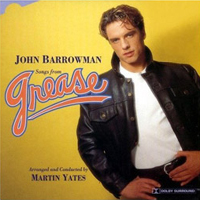 Studio Cast, 1994 (JAY)
Studio Cast, 1994 (JAY)  (2 / 5) This recording would be superfluous if not for the participation of John Barrowman, a Scottish-born singing actor who became a star of the London musical stage as a young man but who, as of this writing, has had only two brief stints on Broadway (in Putting It Together and Sunset Boulevard). Barrowman brings his strong, clear, sexy tenor to Danny’s songs and to the ridiculous “Grease” disco number that was written for the movie. The other three song additions to the flick are also included here. As Sandy, Shona Lindsay makes unpleasant sounds when belting at the top of her range. There’s nothing distinctive about the rest of the cast members, some of whom are less successful than others at masking their Brit accents. — M.P.
(2 / 5) This recording would be superfluous if not for the participation of John Barrowman, a Scottish-born singing actor who became a star of the London musical stage as a young man but who, as of this writing, has had only two brief stints on Broadway (in Putting It Together and Sunset Boulevard). Barrowman brings his strong, clear, sexy tenor to Danny’s songs and to the ridiculous “Grease” disco number that was written for the movie. The other three song additions to the flick are also included here. As Sandy, Shona Lindsay makes unpleasant sounds when belting at the top of her range. There’s nothing distinctive about the rest of the cast members, some of whom are less successful than others at masking their Brit accents. — M.P.
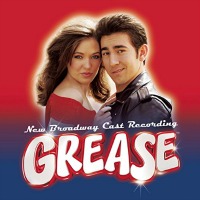 Broadway Cast, 2007 (Masterworks Broadway)
Broadway Cast, 2007 (Masterworks Broadway)  (3 / 5) If one were to make a list of cast recordings that are far more enjoyable in their own right than the shows that yielded them, this one would place pretty high on it. The latest Broadway production to bear the title Grease — this time without the silly exclamation point that was used for the 1994 revisal — had a huge red flag attached to it from the moment it was announced that the leading roles of Danny Zuko and Sandy Dumbrowski would be cast via a TV “reality” series called Grease: You’re the One That I Want! (There’s that exclamation point!) What ended up on stage was not good in terms of Kathleen Marshall’s way-off-base direction or the design elements. For better or (some would say) worse, the song stack included the now almost obligatory numbers that were written for the monster hit film of Grease: the title song, “Hopelessly Devoted to You,” “Sandy,” and yes, “You’re the One That I Want.” Of the two leads chosen by way of that idiotic TV show, only one — Laura Osnes as Sandy — proved to be ideal in every way. Count her among the cast album’s biggest assets. And though Max Crumm was/is not right for Danny in terms of physical type or personality, his vocal performance is thoroughly satisfying. Jenny Powers sounds a little square as Rizzo, but Matthew Saldivar as Kenickie does a great, sexy job with “Greased Lightnin’.” (Note that in this version, for some reason, the chicks scream rather than cream.) Ryan Patrick Binder is appealing in Doody’s “Magic Changes,” and the rest of the cast includes such talents as Stephen R. Buntrock as Teen Angel and Lindsay Mendez in her Broadway debut as Jan. The arrangements and orchestrations (by Christopher Jahnke) are not overblown as on the 1994 recording, and the sound mix is excellent. — M.P.
(3 / 5) If one were to make a list of cast recordings that are far more enjoyable in their own right than the shows that yielded them, this one would place pretty high on it. The latest Broadway production to bear the title Grease — this time without the silly exclamation point that was used for the 1994 revisal — had a huge red flag attached to it from the moment it was announced that the leading roles of Danny Zuko and Sandy Dumbrowski would be cast via a TV “reality” series called Grease: You’re the One That I Want! (There’s that exclamation point!) What ended up on stage was not good in terms of Kathleen Marshall’s way-off-base direction or the design elements. For better or (some would say) worse, the song stack included the now almost obligatory numbers that were written for the monster hit film of Grease: the title song, “Hopelessly Devoted to You,” “Sandy,” and yes, “You’re the One That I Want.” Of the two leads chosen by way of that idiotic TV show, only one — Laura Osnes as Sandy — proved to be ideal in every way. Count her among the cast album’s biggest assets. And though Max Crumm was/is not right for Danny in terms of physical type or personality, his vocal performance is thoroughly satisfying. Jenny Powers sounds a little square as Rizzo, but Matthew Saldivar as Kenickie does a great, sexy job with “Greased Lightnin’.” (Note that in this version, for some reason, the chicks scream rather than cream.) Ryan Patrick Binder is appealing in Doody’s “Magic Changes,” and the rest of the cast includes such talents as Stephen R. Buntrock as Teen Angel and Lindsay Mendez in her Broadway debut as Jan. The arrangements and orchestrations (by Christopher Jahnke) are not overblown as on the 1994 recording, and the sound mix is excellent. — M.P.
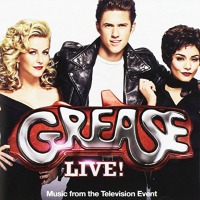 Television Cast, 2016 (Republic Records)
Television Cast, 2016 (Republic Records)  (3 / 5) A new wave of live TV presentations of Broadway musicals began in 2013 with a mostly terrible production of The Sound Of Music, since followed by several others that were not much better. Given that low bar of achievement, the best of the lot by a wide margin was Grease: Live, which aired on January 31, 2016. On the one hand, what millions of viewers saw that night was hugely different from the musical as originally conceived, written, and presented in the early 1970s; a few songs were added that had never been heard in any previous version of the show (or the movie), and the script was heavily revised by Jonathan Tolins and Robert Cary. But Grease: Live was very well done in terms of its production elements and its direction by Thomas Kail (of Broadway’s Hamilton and In The Heights) and Alex Rudzinski. A generally strong cast is headed by Aaron Tveit as Danny and Julianne Hough as Sandy (here given a new surname, “Young”), with Carlos PenaVega as Kenickie, Jordan Fisher as Doody, and Carly Rae Jepsen as Frenchy (handed a new song, “All I Need is an Angel,” by the Broadway team of Tom Kitt and Brian Yorkey). The one weak link is Vanessa Hudgens as Rizzo; her voice has a thin, bright timbre that’s all wrong for the role, and her interpretation of the songs mostly consists of aping Stockard Channing’s renditions in the film. There are also appearances by everyone from Jessie J singing the title song to Boyz II Men as the “Teen Angels” to Joe Jonas and DNCE as “Johnny Casino and the Gamblers.” Both the video and audio versions of this Grease are enjoyable if you’re willing to accept something that only intermittently resembles the property that first bore the title. — M.P.
(3 / 5) A new wave of live TV presentations of Broadway musicals began in 2013 with a mostly terrible production of The Sound Of Music, since followed by several others that were not much better. Given that low bar of achievement, the best of the lot by a wide margin was Grease: Live, which aired on January 31, 2016. On the one hand, what millions of viewers saw that night was hugely different from the musical as originally conceived, written, and presented in the early 1970s; a few songs were added that had never been heard in any previous version of the show (or the movie), and the script was heavily revised by Jonathan Tolins and Robert Cary. But Grease: Live was very well done in terms of its production elements and its direction by Thomas Kail (of Broadway’s Hamilton and In The Heights) and Alex Rudzinski. A generally strong cast is headed by Aaron Tveit as Danny and Julianne Hough as Sandy (here given a new surname, “Young”), with Carlos PenaVega as Kenickie, Jordan Fisher as Doody, and Carly Rae Jepsen as Frenchy (handed a new song, “All I Need is an Angel,” by the Broadway team of Tom Kitt and Brian Yorkey). The one weak link is Vanessa Hudgens as Rizzo; her voice has a thin, bright timbre that’s all wrong for the role, and her interpretation of the songs mostly consists of aping Stockard Channing’s renditions in the film. There are also appearances by everyone from Jessie J singing the title song to Boyz II Men as the “Teen Angels” to Joe Jonas and DNCE as “Johnny Casino and the Gamblers.” Both the video and audio versions of this Grease are enjoyable if you’re willing to accept something that only intermittently resembles the property that first bore the title. — M.P.
The Grass Harp
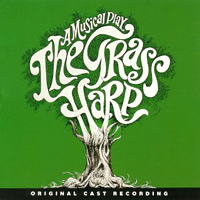 Original Broadway Cast, 1971 (Painted Smiles/Varèse Sarabande)
Original Broadway Cast, 1971 (Painted Smiles/Varèse Sarabande)  (5 / 5) Even if it didn’t star Barbara Cook, in resplendent voice in her last Broadway musical, this would be the most glorious cast album that you’ve never heard. A messy book (from Truman Capote’s novella) and under-financing shuttered the poorly received show after five performances in 1971. But this recording, made some months later with almost the entire original cast (a chorus of adults subbed for a chorus of children), preserves the lustrous music of Claibe Richardson and the sharp lyrics of Kenward Elmslie that combine to conjure up the rustic South in the early part of the 20th century. Cook plays Dollyheart, who tends the home of her breadwinner sister Verena (Ruth Ford), who has fallen in love with Dr. Morris Ritz (Max Showalter). The doc wants to market the dropsy cure that Dollyheart’s been making in the backyard with nephew Collin (Russ Thacker) and maid Catherine (Carol Brice). But Dollyheart won’t give up her secret formula, and this causes Verena to lash out at her. So Dollyheart takes Collin, Catherine, and the cure with her on what becomes a modest adventure with a faith healer (Karen Morrow). It’s all set to a fine score with orchestrations split among old master Robert Russell Bennett, new master Jonathan Tunick, and jazz specialist J. Billy Ver Planck. Cook has two beautiful ballads, “Chain of Love” and “Reach Out.” Brice gets one that’s a bolt of lightning, “If There’s Love Enough,” and another that’s top-notch comedy, “Marry With Me.” Thacker delivers the raucous “Floozies” and the more tender “This One Day,” while Morrow gets the 12-minute masterpiece “The Babylove Miracle Show,” in which the faith healer encourages her listeners to “hang a little moolah on the wash line.” It might well seduce you into opening your wallet; you’ll be glad you did so in order to buy the cast album of The Grass Harp. — Peter Filichia
(5 / 5) Even if it didn’t star Barbara Cook, in resplendent voice in her last Broadway musical, this would be the most glorious cast album that you’ve never heard. A messy book (from Truman Capote’s novella) and under-financing shuttered the poorly received show after five performances in 1971. But this recording, made some months later with almost the entire original cast (a chorus of adults subbed for a chorus of children), preserves the lustrous music of Claibe Richardson and the sharp lyrics of Kenward Elmslie that combine to conjure up the rustic South in the early part of the 20th century. Cook plays Dollyheart, who tends the home of her breadwinner sister Verena (Ruth Ford), who has fallen in love with Dr. Morris Ritz (Max Showalter). The doc wants to market the dropsy cure that Dollyheart’s been making in the backyard with nephew Collin (Russ Thacker) and maid Catherine (Carol Brice). But Dollyheart won’t give up her secret formula, and this causes Verena to lash out at her. So Dollyheart takes Collin, Catherine, and the cure with her on what becomes a modest adventure with a faith healer (Karen Morrow). It’s all set to a fine score with orchestrations split among old master Robert Russell Bennett, new master Jonathan Tunick, and jazz specialist J. Billy Ver Planck. Cook has two beautiful ballads, “Chain of Love” and “Reach Out.” Brice gets one that’s a bolt of lightning, “If There’s Love Enough,” and another that’s top-notch comedy, “Marry With Me.” Thacker delivers the raucous “Floozies” and the more tender “This One Day,” while Morrow gets the 12-minute masterpiece “The Babylove Miracle Show,” in which the faith healer encourages her listeners to “hang a little moolah on the wash line.” It might well seduce you into opening your wallet; you’ll be glad you did so in order to buy the cast album of The Grass Harp. — Peter Filichia
The Grand Tour
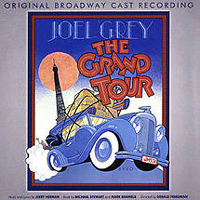 Original Broadway Cast, 1979 (Columbia/Fynsworth Alley)
Original Broadway Cast, 1979 (Columbia/Fynsworth Alley)  (2 / 5) This is the cheeriest musical ever written about escaping from the Nazis. Jerry Herman has dismissed the show as a mistake (“It just didn’t have the energy and excitement to be a real hit”), but no Herman score is without interest. Michael Stewart adapted S. N. Behrman’s play Jacobowsky and the Colonel, itself an adaptation of a work by Franz Werfel. Set in 1940, the plot centers on a Jewish refugee (Joel Grey) trying to get out of German-occupied France in the company of a chilly, anti-Semitic Polish colonel (Ron Holgate) and his girlfriend, Marianne (Florence Lacey). Some of the score is extraordinary, including Jacobowsky’s signature tune “I’ll Be Here Tomorrow,” rendered unforgettably by Grey; Marianne’s hymn to her home, “I Belong Here”; and Holgate’s lovely ballad “Marianne.” But Herman’s generally bouncy attitude has an undermining effect on what is, after all, a very dramatic story. A number on a train, “We’re Almost There,” is disconcertingly upbeat. So is “You I Like,” sung when the two men finally bond. “For Poland,” in which Jacobowsky coaxes the colonel into letting him come along, sounds like the football fight song of a Midwestern university. (Philip J. Lang’s orchestrations only accentuate the positive.) All three leads are superb, however, and the score is never less than easy to take. — David Barbour
(2 / 5) This is the cheeriest musical ever written about escaping from the Nazis. Jerry Herman has dismissed the show as a mistake (“It just didn’t have the energy and excitement to be a real hit”), but no Herman score is without interest. Michael Stewart adapted S. N. Behrman’s play Jacobowsky and the Colonel, itself an adaptation of a work by Franz Werfel. Set in 1940, the plot centers on a Jewish refugee (Joel Grey) trying to get out of German-occupied France in the company of a chilly, anti-Semitic Polish colonel (Ron Holgate) and his girlfriend, Marianne (Florence Lacey). Some of the score is extraordinary, including Jacobowsky’s signature tune “I’ll Be Here Tomorrow,” rendered unforgettably by Grey; Marianne’s hymn to her home, “I Belong Here”; and Holgate’s lovely ballad “Marianne.” But Herman’s generally bouncy attitude has an undermining effect on what is, after all, a very dramatic story. A number on a train, “We’re Almost There,” is disconcertingly upbeat. So is “You I Like,” sung when the two men finally bond. “For Poland,” in which Jacobowsky coaxes the colonel into letting him come along, sounds like the football fight song of a Midwestern university. (Philip J. Lang’s orchestrations only accentuate the positive.) All three leads are superb, however, and the score is never less than easy to take. — David Barbour
A Grand Night for Singing
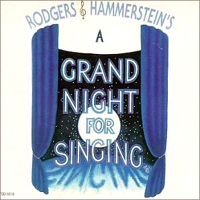 Members of the Broadway Cast, 1994 (Varèse Sarabande)
Members of the Broadway Cast, 1994 (Varèse Sarabande)  (2 / 5) This revue of songs from Rodgers and Hammerstein musicals was directed by Walter Bobbie, with musical direction by Fred Wells. It opened at the now-defunct, high-class cabaret venue Rainbow & Stars at Rockefeller Center in 1993; then, later that year, the show had a brief run on Broadway in a Roundabout Theatre production. It’s an amiable compilation of beloved standards such as “Hello, Young Lovers,” “If I Loved You,” “Some Enchanted Evening,” “Oh, What a Beautiful Mornin’,” and “It Might as Well Be Spring,” along with several of the team’s songs that are not as famous but well worth hearing, including as “So Far” and “Don’t Marry Me.” Some of the songs are performed in full, while others are excerpted in medleys. The show received Tony Award nominations for Best Musical and, believe it or not, Best Book of a Musical. This recording features the Broadway company — Victoria Clark, Jason Graae, Alyson Reed, Lynne Wintersteller — plus Gregg Edelman filling in for Martin Vidnovic. The songs of Rodgers and Hammerstein, like those of Stephen Sondheim, tend not to work very well in a revue format because they were so skillfully tailored to specific characters and situations. Two that suffer greatly when taken out of context are the comedic “I Cain’t Say No” from Oklahoma! and “Honey Bun” from South Pacific. Others stand better on their own, for example, the ballads “Do I Love You Because You’re Beautiful?” (from Cinderella) and “This Nearly Was Mine” (from South Pacific). This recording can’t hold a candle to any cast album of a full Rodgers and Hammerstein musical, but it can be enjoyed as a sampler of the legendary team’s work. — Michael Portantiere
(2 / 5) This revue of songs from Rodgers and Hammerstein musicals was directed by Walter Bobbie, with musical direction by Fred Wells. It opened at the now-defunct, high-class cabaret venue Rainbow & Stars at Rockefeller Center in 1993; then, later that year, the show had a brief run on Broadway in a Roundabout Theatre production. It’s an amiable compilation of beloved standards such as “Hello, Young Lovers,” “If I Loved You,” “Some Enchanted Evening,” “Oh, What a Beautiful Mornin’,” and “It Might as Well Be Spring,” along with several of the team’s songs that are not as famous but well worth hearing, including as “So Far” and “Don’t Marry Me.” Some of the songs are performed in full, while others are excerpted in medleys. The show received Tony Award nominations for Best Musical and, believe it or not, Best Book of a Musical. This recording features the Broadway company — Victoria Clark, Jason Graae, Alyson Reed, Lynne Wintersteller — plus Gregg Edelman filling in for Martin Vidnovic. The songs of Rodgers and Hammerstein, like those of Stephen Sondheim, tend not to work very well in a revue format because they were so skillfully tailored to specific characters and situations. Two that suffer greatly when taken out of context are the comedic “I Cain’t Say No” from Oklahoma! and “Honey Bun” from South Pacific. Others stand better on their own, for example, the ballads “Do I Love You Because You’re Beautiful?” (from Cinderella) and “This Nearly Was Mine” (from South Pacific). This recording can’t hold a candle to any cast album of a full Rodgers and Hammerstein musical, but it can be enjoyed as a sampler of the legendary team’s work. — Michael Portantiere
Grand Hotel
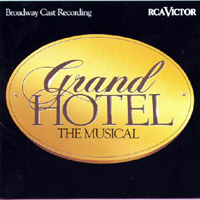 Broadway Cast, 1992 (RCA)
Broadway Cast, 1992 (RCA)  (4 / 5) Based on the Vicki Baum novel that inspired the classic MGM film, Grand Hotel traveled a crooked road to Broadway. The first pass at the material, by librettist Luther Davis and songwriters Robert Wright and George Forrest, was titled At the Grand. It closed out of town in 1958. Decades later, the project was resurrected by director-choreographer Tommy Tune. When trouble set in on the road, Tune brought in Peter Stone to rewrite the book and Maury Yeston to write seven new numbers and revise existing ones — with no credit and little credit, respectively. Even with mixed reviews, Grand Hotel ran over a thousand performances. It was widely felt that Tune’s brilliant staging had triumphed over weak material. But, as this disc shows, the score is no cut-and-paste job; every song meshes perfectly in this drama of life, death, and reversals of fortune in a Weimar Berlin hotel. In fact, it’s hard to tell who composed which songs without referring to the notes, especially since it’s not indicated which of the Wright/Forrest songs were revised by Yeston. Peter Matz’s orchestrations merge sinister, Kurt Weillesque downbeats with tinselly tea-dance rhythms and soaring melodies to create a brooding score that perfectly mirrors the fatalistic narrative. There are some routine items here, but the best songs are thrilling, including the romantic “Love Can’t Happen,” the sizzling jazz duet “Maybe My Baby Loves Me,” and “I Want to Go to Hollywood,” a bouncy number with dark undertones. (The first- and third-named of these are by Yeston, the second by Wright/Forrest). Recorded late in the show’s run, the disc features most of the original cast, including Liliane Montevecchi as an aging ballerina, Karen Akers as her devoted companion, Jane Krakowski as a sexy stenographer, and Michael Jeter as a dying bookkeeper. Sadly, David Carroll, who played Montevecchi’s doomed lover, died of AIDS before he could record his performance; his songs are covered by his capable replacement, Brent Barrett, and a bonus track features a live recording of Carroll singing “Love Can’t Happen” in a cabaret revue. Overall, Grand Hotel is a potent musical soap opera. — David Barbour
(4 / 5) Based on the Vicki Baum novel that inspired the classic MGM film, Grand Hotel traveled a crooked road to Broadway. The first pass at the material, by librettist Luther Davis and songwriters Robert Wright and George Forrest, was titled At the Grand. It closed out of town in 1958. Decades later, the project was resurrected by director-choreographer Tommy Tune. When trouble set in on the road, Tune brought in Peter Stone to rewrite the book and Maury Yeston to write seven new numbers and revise existing ones — with no credit and little credit, respectively. Even with mixed reviews, Grand Hotel ran over a thousand performances. It was widely felt that Tune’s brilliant staging had triumphed over weak material. But, as this disc shows, the score is no cut-and-paste job; every song meshes perfectly in this drama of life, death, and reversals of fortune in a Weimar Berlin hotel. In fact, it’s hard to tell who composed which songs without referring to the notes, especially since it’s not indicated which of the Wright/Forrest songs were revised by Yeston. Peter Matz’s orchestrations merge sinister, Kurt Weillesque downbeats with tinselly tea-dance rhythms and soaring melodies to create a brooding score that perfectly mirrors the fatalistic narrative. There are some routine items here, but the best songs are thrilling, including the romantic “Love Can’t Happen,” the sizzling jazz duet “Maybe My Baby Loves Me,” and “I Want to Go to Hollywood,” a bouncy number with dark undertones. (The first- and third-named of these are by Yeston, the second by Wright/Forrest). Recorded late in the show’s run, the disc features most of the original cast, including Liliane Montevecchi as an aging ballerina, Karen Akers as her devoted companion, Jane Krakowski as a sexy stenographer, and Michael Jeter as a dying bookkeeper. Sadly, David Carroll, who played Montevecchi’s doomed lover, died of AIDS before he could record his performance; his songs are covered by his capable replacement, Brent Barrett, and a bonus track features a live recording of Carroll singing “Love Can’t Happen” in a cabaret revue. Overall, Grand Hotel is a potent musical soap opera. — David Barbour
Goodtime Charley
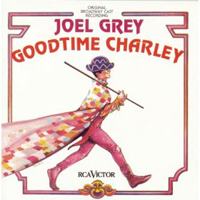 Original Broadway Cast, 1976 (RCA)
Original Broadway Cast, 1976 (RCA)  (3 / 5) As he did with Ben Franklin in Paris, librettist Sidney Michaels — this time leaving the lyrics to other, more expert hands — tried to give old European history new Broadway pizzazz in this somewhat cumbersome retelling of Charles VII’s relationship with Joan of Arc. If that sounds to you like a topic that doesn’t naturally sing, you’re right; there are abrupt shifts of tone between heavy, Old World seriousness and musical-comedy silliness. And, oddly for a big Broadway score, nearly all of Larry Grossman and Hal Hackady’s songs are given to Charles (Joel Grey) or Joan (Ann Reinking), leaving little for the chorus or for the large, interesting supporting cast (Susan Browning, Richard B. Shull, Grace Keagy, Louis Zorich, Jay Garner, and others) to do. Still, Grossman and Hackady offer an enterprising attempt at a traditional Broadway-style score of wit and substance. There are no inappropriate rock posturings here, but there are some quite wonderful lyrics in such numbers as “Why Can’t We All Be Nice?” and “Voices and Visions.” Speaking of voices, Reinking’s has an unpleasant, pseudo-Gwen Verdon rasp. And Grey — outfitted with all the accoutrements of a big-musical leading role, including a heavy breathing 11-o’clock number — tends to over-emote. But this is a score of which connoisseurs of musical theater are understandably fond, and the recording is a lively, tuneful history lesson bolstered by Jonathan Tunick’s excellent orchestrations. — Marc Miller
(3 / 5) As he did with Ben Franklin in Paris, librettist Sidney Michaels — this time leaving the lyrics to other, more expert hands — tried to give old European history new Broadway pizzazz in this somewhat cumbersome retelling of Charles VII’s relationship with Joan of Arc. If that sounds to you like a topic that doesn’t naturally sing, you’re right; there are abrupt shifts of tone between heavy, Old World seriousness and musical-comedy silliness. And, oddly for a big Broadway score, nearly all of Larry Grossman and Hal Hackady’s songs are given to Charles (Joel Grey) or Joan (Ann Reinking), leaving little for the chorus or for the large, interesting supporting cast (Susan Browning, Richard B. Shull, Grace Keagy, Louis Zorich, Jay Garner, and others) to do. Still, Grossman and Hackady offer an enterprising attempt at a traditional Broadway-style score of wit and substance. There are no inappropriate rock posturings here, but there are some quite wonderful lyrics in such numbers as “Why Can’t We All Be Nice?” and “Voices and Visions.” Speaking of voices, Reinking’s has an unpleasant, pseudo-Gwen Verdon rasp. And Grey — outfitted with all the accoutrements of a big-musical leading role, including a heavy breathing 11-o’clock number — tends to over-emote. But this is a score of which connoisseurs of musical theater are understandably fond, and the recording is a lively, tuneful history lesson bolstered by Jonathan Tunick’s excellent orchestrations. — Marc Miller
Good News
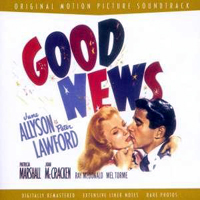 Film Soundtrack, 1947 (MGM/Rhino)
Film Soundtrack, 1947 (MGM/Rhino)  (2 / 5) The first movie written by Betty Comden and Adolph Green for MGM, Good News has a smart and funny script. Only six songs were retained from the original 1927 hit stage musical by Ray Henderson, Lew Brown, and B. G. DeSylva. Three of them — the title song, “The Varsity Drag,” and “He’s a Ladies’ Man” (here changed to “Be a Ladies’ Man”) — were extensively reworked by vocal arranger Kay Thompson and co-producer Roger Edens. In addition, Edens wrote two new songs with Comden and Green: “The French Lesson,” a real highlight, and “An Easier Way,” which didn’t make it to the final cut of the film. Also interpolated was the Edens-Hugh Martin-Ralph Blane number “Pass That Peace Pipe.” Leads Peter Lawford and June Allyson sing passably well. The third major player, Broadway dancer and comedienne Joan McCracken, was more comfortable dancing than singing and is perhaps more effective in the film than on this recording. Though the show and the movie take place in the 1920s, no attempt was made to capture the feel of that era in the musical arrangements, which sound like ’40s pop. The Rhino CD marked the first complete release of the soundtrack; it includes Mel Torme’s outtake reprise of “Lucky in Love” and the deleted “An Easier Way,” an interesting piece that contrasts the characters played by Allyson and Patricia Marshall. The CD also has a dopey interview with Allyson and two cuts, “The Varsity Drag” and the title song, from the apparently lost 1930 film version of the stage musical. — David Wolf
(2 / 5) The first movie written by Betty Comden and Adolph Green for MGM, Good News has a smart and funny script. Only six songs were retained from the original 1927 hit stage musical by Ray Henderson, Lew Brown, and B. G. DeSylva. Three of them — the title song, “The Varsity Drag,” and “He’s a Ladies’ Man” (here changed to “Be a Ladies’ Man”) — were extensively reworked by vocal arranger Kay Thompson and co-producer Roger Edens. In addition, Edens wrote two new songs with Comden and Green: “The French Lesson,” a real highlight, and “An Easier Way,” which didn’t make it to the final cut of the film. Also interpolated was the Edens-Hugh Martin-Ralph Blane number “Pass That Peace Pipe.” Leads Peter Lawford and June Allyson sing passably well. The third major player, Broadway dancer and comedienne Joan McCracken, was more comfortable dancing than singing and is perhaps more effective in the film than on this recording. Though the show and the movie take place in the 1920s, no attempt was made to capture the feel of that era in the musical arrangements, which sound like ’40s pop. The Rhino CD marked the first complete release of the soundtrack; it includes Mel Torme’s outtake reprise of “Lucky in Love” and the deleted “An Easier Way,” an interesting piece that contrasts the characters played by Allyson and Patricia Marshall. The CD also has a dopey interview with Allyson and two cuts, “The Varsity Drag” and the title song, from the apparently lost 1930 film version of the stage musical. — David Wolf
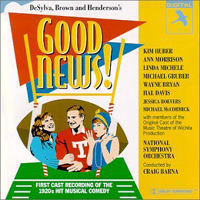 Studio Recording With Cast Members of the Music Theatre of Wichita Production, 1996 (TER-JAY)
Studio Recording With Cast Members of the Music Theatre of Wichita Production, 1996 (TER-JAY)  (2 / 5) Some months after the closing of an unsuccessful 1975 Broadway revival of Good News, cast member Wayne Bryan produced a privately issued album of that production from a tape of a live performance, plus a second LP containing items that had been cut during the show’s tryout. In an ideal world, this is the recording that would be widely available, but it is not. Bryan never lost his fondness for this material, and years later, as producing director for the Music Theatre of Wichita, he and writer-director Mark Madama got permission to write a new version of the show. That successful 1993 production was the basis for the album at hand. Though it presents the basic, original stage score plus seven more Henderson-Brown-DeSylva songs, including “Button Up Your Overcoat,” “You’re the Cream in My Coffee,” “Life Is Just a Bowl of Cherries,” and “Keep Your Sunny Side Up,” the recording is a little pale. Craig Barna’s orchestrations are thin, and his musical direction doesn’t have much spirit. The performers — Ann Morrison, Michael Gruber, Kim Huber, Linda Michele, and Jessica Boevers — are fairly colorless. They’re joined by Wayne Bryan himself, who was probably too old by then to play an undergraduate but who still sounds terrific, especially in “Never Swat a Fly.” With its irresistible score and archetypal plot about a football player who must pass his astronomy final if he wants to play in the Big Game, Good News is good fun, and while this disc isn’t bad by any means, the material deserves to be performed with a little more sass. — D.W.
(2 / 5) Some months after the closing of an unsuccessful 1975 Broadway revival of Good News, cast member Wayne Bryan produced a privately issued album of that production from a tape of a live performance, plus a second LP containing items that had been cut during the show’s tryout. In an ideal world, this is the recording that would be widely available, but it is not. Bryan never lost his fondness for this material, and years later, as producing director for the Music Theatre of Wichita, he and writer-director Mark Madama got permission to write a new version of the show. That successful 1993 production was the basis for the album at hand. Though it presents the basic, original stage score plus seven more Henderson-Brown-DeSylva songs, including “Button Up Your Overcoat,” “You’re the Cream in My Coffee,” “Life Is Just a Bowl of Cherries,” and “Keep Your Sunny Side Up,” the recording is a little pale. Craig Barna’s orchestrations are thin, and his musical direction doesn’t have much spirit. The performers — Ann Morrison, Michael Gruber, Kim Huber, Linda Michele, and Jessica Boevers — are fairly colorless. They’re joined by Wayne Bryan himself, who was probably too old by then to play an undergraduate but who still sounds terrific, especially in “Never Swat a Fly.” With its irresistible score and archetypal plot about a football player who must pass his astronomy final if he wants to play in the Big Game, Good News is good fun, and while this disc isn’t bad by any means, the material deserves to be performed with a little more sass. — D.W.
The Goodbye Girl
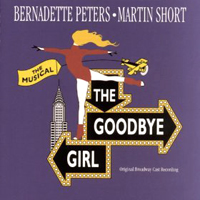 Original Broadway Cast, 1993 (Columbia/Sony)
Original Broadway Cast, 1993 (Columbia/Sony)  (3 / 5) The Goodbye Girl is a fine movie that was probably not a sound choice for adaptation as a stage musical, even if crafted by gifted, intelligent people, as it was: The Neil Simon plot is too uncomplicated and event-free, the characters too “small” and too few. The resulting show featured three major characters and an irrelevant landlady wandering through massive sets, twice running into some chorus dancers who might have come from a musical playing down the block. Composer Marvin Hamlisch and lyricist David Zippel certainly know how to write good songs, and their score is never less than professional. But instead of helping to progress the plot, the numbers just slow things down. Martin Short as Elliot got the best of the songs: “My Rules,” “I Think I Can Play This Part,” and “Paula: An Improvised Love Song,” all of which gave him plenty of room to clown. Top-billed Bernadette Peters, as Paula, wasn’t so lucky, having been handed some fairly generic ballads; but she does very well when the material is there for her, as in “A Beat Behind” and “Good News/Bad News.” The orchestrations of Billy Byers and Torrie Zito are slick and sharp, and the album is quite pleasant to listen to even if the score is never inspired. — David Wolf
(3 / 5) The Goodbye Girl is a fine movie that was probably not a sound choice for adaptation as a stage musical, even if crafted by gifted, intelligent people, as it was: The Neil Simon plot is too uncomplicated and event-free, the characters too “small” and too few. The resulting show featured three major characters and an irrelevant landlady wandering through massive sets, twice running into some chorus dancers who might have come from a musical playing down the block. Composer Marvin Hamlisch and lyricist David Zippel certainly know how to write good songs, and their score is never less than professional. But instead of helping to progress the plot, the numbers just slow things down. Martin Short as Elliot got the best of the songs: “My Rules,” “I Think I Can Play This Part,” and “Paula: An Improvised Love Song,” all of which gave him plenty of room to clown. Top-billed Bernadette Peters, as Paula, wasn’t so lucky, having been handed some fairly generic ballads; but she does very well when the material is there for her, as in “A Beat Behind” and “Good News/Bad News.” The orchestrations of Billy Byers and Torrie Zito are slick and sharp, and the album is quite pleasant to listen to even if the score is never inspired. — David Wolf
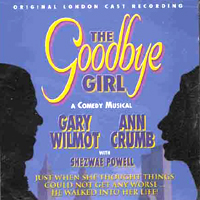 Original London Cast, 1997 (First Night)
Original London Cast, 1997 (First Night)  (1 / 5) Four years after the failure of The Goodbye Girl on Broadway, Neil Simon tried again, this time in London. He brought along composer Marvin Hamlisch but, for whatever reason, not lyricist David Zippel. So, except for the two best Zippel songs — “My Rules” and “Good News/Bad News” — this is an entirely new score with lyrics by Don Black. And it’s much worse. Zippel, an extremely clever wordsmith, wrote lyrics that were always believable extensions of the script. Black’s are just pop songs. For the most part, they’re vague, uninteresting, and difficult to understand. (One lyric goes: “I’Il take the sky / I’ll take the moon / I’ll take the child with the yellow balloon.”) The basic flatness of the characters doesn’t help; nor does Ann Crumb as Paula, whose diction is simply terrible. And Gary Wilmot is unimpressive as Elliot. Hamlisch’s new music is loud and, in an attempt to be more “contemporary,” uncharacteristically ugly — at least, as heard in these trashy arrangements. On Broadway, The Goodbye Girl was a classy failure, but this version sounds like just another flop. — D.W.
(1 / 5) Four years after the failure of The Goodbye Girl on Broadway, Neil Simon tried again, this time in London. He brought along composer Marvin Hamlisch but, for whatever reason, not lyricist David Zippel. So, except for the two best Zippel songs — “My Rules” and “Good News/Bad News” — this is an entirely new score with lyrics by Don Black. And it’s much worse. Zippel, an extremely clever wordsmith, wrote lyrics that were always believable extensions of the script. Black’s are just pop songs. For the most part, they’re vague, uninteresting, and difficult to understand. (One lyric goes: “I’Il take the sky / I’ll take the moon / I’ll take the child with the yellow balloon.”) The basic flatness of the characters doesn’t help; nor does Ann Crumb as Paula, whose diction is simply terrible. And Gary Wilmot is unimpressive as Elliot. Hamlisch’s new music is loud and, in an attempt to be more “contemporary,” uncharacteristically ugly — at least, as heard in these trashy arrangements. On Broadway, The Goodbye Girl was a classy failure, but this version sounds like just another flop. — D.W.
Goldilocks
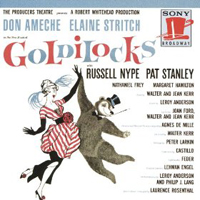 Original Broadway Cast, 1958 (Columbia/Sony)
Original Broadway Cast, 1958 (Columbia/Sony)  (3 / 5) Here, Elaine Stritch plays a pre-World War I stage star entangled with a fly-by-night silent movie director (Don Ameche) who yearns to make an epic about ancient Egypt. The hilarious book by Walter and Jean Kerr was dismissed by the critics, for some reason. But the urbanely amusing score — music by composer Leroy Anderson, lyrics by the Kerrs and Joan Ford — provides a droll showcase for Stritch. She’s a ball of fire in “Give the Little Lady” and rollicking in the comic lament “Who’s Been Sitting in My Chair?” (“Who’s been sleeping in my bed? / Just me, just moi / I’d like a two-fisted biped / For my boudoir.”) Stritch is a riot when criticizing a too-reasonable lover (“The Beast in You”), and ruefully touching in the confessional “I Never Know When to Say When.” Ameche is suitably sardonic as her love/hate object, and Nathaniel Frey and Margaret Hamilton as Ameche’s moviemaking cronies score in a pair of clever comedy numbers, “Bad Companions” and “Two Years in the Making.” Anderson’s music neatly blends period music styles into a standard 1950s Broadway sound — he himself wrote the orchestrations in collaboration with Philip J. Lang — and the lyrics are dryly witty throughout. Romantics looking for soulful ballads needn’t bother; for everyone else, this album is good, sophisticated fun, with Stritch at her peak. — David Barbour
(3 / 5) Here, Elaine Stritch plays a pre-World War I stage star entangled with a fly-by-night silent movie director (Don Ameche) who yearns to make an epic about ancient Egypt. The hilarious book by Walter and Jean Kerr was dismissed by the critics, for some reason. But the urbanely amusing score — music by composer Leroy Anderson, lyrics by the Kerrs and Joan Ford — provides a droll showcase for Stritch. She’s a ball of fire in “Give the Little Lady” and rollicking in the comic lament “Who’s Been Sitting in My Chair?” (“Who’s been sleeping in my bed? / Just me, just moi / I’d like a two-fisted biped / For my boudoir.”) Stritch is a riot when criticizing a too-reasonable lover (“The Beast in You”), and ruefully touching in the confessional “I Never Know When to Say When.” Ameche is suitably sardonic as her love/hate object, and Nathaniel Frey and Margaret Hamilton as Ameche’s moviemaking cronies score in a pair of clever comedy numbers, “Bad Companions” and “Two Years in the Making.” Anderson’s music neatly blends period music styles into a standard 1950s Broadway sound — he himself wrote the orchestrations in collaboration with Philip J. Lang — and the lyrics are dryly witty throughout. Romantics looking for soulful ballads needn’t bother; for everyone else, this album is good, sophisticated fun, with Stritch at her peak. — David Barbour
Golden Rainbow
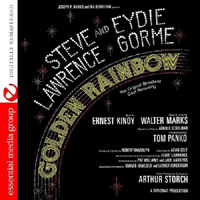 Original Broadway Cast, 1968 (Calendar/GL Music/Essential Media Group)
Original Broadway Cast, 1968 (Calendar/GL Music/Essential Media Group)  (3 / 5) The ultimate in “guilty pleasure” musicals, Golden Rainbow took Arnold Schulman’s charming little play A Hole in the Head and pumped it up into a glitzy, glamorous musical set in — where else? — Las Vegas. Walter Marks’ score yielded a smash hit for Steve Lawrence, “I’ve Got to Be Me.” Lawrence co-starred in the show with his wife, Eydie Gorme. Although her acting ability was decidedly limited, Gorme could really belt out a ballad, and Marks gave her a good one: “He Needs Me Now.” Like Vegas itself, Golden Rainbow glitters but doesn’t have a lot of depth; just read the song titles and you can pretty much tell what they’re all about. Still, it’s an upbeat score that’s perfect for listening and singing along. As heard on the original LP release, the album is high in energy, moving along with rapid momentum. Some of that is due to the orchestrations of Jack Andrews and Pat Williams, and the conducting of the esteemed Elliot Lawrence — but it’s also because the finished master tape wouldn’t fit the time limitations of a vinyl LP, so they just sped up the tape! When Steve and Eydie themselves released the CD in the early 2000s, they kept the pace exactly as it was: breathless. Fortunately, a later remastering of the recording, available on demand as a CD-R, corrected the speed problem. — Ken Bloom
(3 / 5) The ultimate in “guilty pleasure” musicals, Golden Rainbow took Arnold Schulman’s charming little play A Hole in the Head and pumped it up into a glitzy, glamorous musical set in — where else? — Las Vegas. Walter Marks’ score yielded a smash hit for Steve Lawrence, “I’ve Got to Be Me.” Lawrence co-starred in the show with his wife, Eydie Gorme. Although her acting ability was decidedly limited, Gorme could really belt out a ballad, and Marks gave her a good one: “He Needs Me Now.” Like Vegas itself, Golden Rainbow glitters but doesn’t have a lot of depth; just read the song titles and you can pretty much tell what they’re all about. Still, it’s an upbeat score that’s perfect for listening and singing along. As heard on the original LP release, the album is high in energy, moving along with rapid momentum. Some of that is due to the orchestrations of Jack Andrews and Pat Williams, and the conducting of the esteemed Elliot Lawrence — but it’s also because the finished master tape wouldn’t fit the time limitations of a vinyl LP, so they just sped up the tape! When Steve and Eydie themselves released the CD in the early 2000s, they kept the pace exactly as it was: breathless. Fortunately, a later remastering of the recording, available on demand as a CD-R, corrected the speed problem. — Ken Bloom
Golden Boy
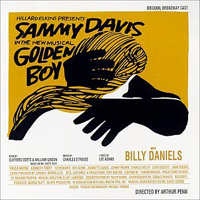 Original Broadway Cast, 1965 (Capitol/Bay Cities/Angel/Razor and Tie)
Original Broadway Cast, 1965 (Capitol/Bay Cities/Angel/Razor and Tie)  (4 / 5) This is a tale of two LPs and three CDs. With music by Charles Strouse and lyrics by Lee Adams, Golden Boy has a book based on the Clifford Odets drama of 1937, adapted for the musical by Odets and William Gibson. The cast album was initially released by Capitol on LP shortly after the Broadway opening, which followed an extended preview period beset by changes to the show and missed performances by Sammy Davis in the title role of boxer Joe Wellington. For the recording sessions, Davis’ voice was tired and strained at times, yet his singing is dynamic and exciting: “Night Song” becomes a cry of pain from the gut; “Stick Around” is devil-may-care yet thrilling; “Colorful” is pungent, funny, and decidedly angry beneath the surface; and “I Want to Be With You,” sung with Paula Wayne as Lorna Moon, is heartfelt and moving. When Davis was in better voice a few months later, he re-recorded his solos and his duet with Wayne for a new LP that replaced the first one. The differences are many. For example, the finale of the first LP was a reprise of “Gimme Some” that was not in the opening-night stage version. In it, Joe’s brother (Louis Gossett) gives the news of Joe’s death to his father and Lorna, then Gossett sings a few lines from “Gimme Some,” joined by Joe from the great beyond. (This may sound cheesy, but it was an effective ending to the album.) The final track on the second LP is the show’s climactic fight, which may have been exciting in the theater but barely registers musically. Also, Davis’ new recording of “Night Song” is smoothly sung, with interpolated notes, but dull in comparison with his brilliant first effort. Other songs that are more effective on the first LP include “Stick Around,” “Can’t You See It”, and “I Want to Be With You.” Unfortunately, all three CD versions contain the re-recordings. Golden Boy is fascinating in that Strouse wrote it in a more mature, jazzy style than his earlier works (Bye Bye Birdie, All American), and Adams’ lyrics are colloquial, pungent, and witty. In “Don’t Forget 127th Street,” Davis, Johnny Brown as his brother-in-law, and their friends boisterously rag on their Harlem neighborhood with smart-ass humor. Another powerful track is the gorgeously sung, gospel-style protest song “No More.” “Everything’s Great” is well sung by Wayne’s Lorna and her loser boyfriend (Kenneth Tobey). Billy Daniels is deliciously evil as Eddie Satin (Joe’s manager), using his famous jazz chops to excellent effect in “This Is the Life” and “While the City Sleeps.” In sum: The CDs and the second LP of the Golden Boy cast album score technical knockouts, but the true champ is the first LP version. — Jeffrey Dunn
(4 / 5) This is a tale of two LPs and three CDs. With music by Charles Strouse and lyrics by Lee Adams, Golden Boy has a book based on the Clifford Odets drama of 1937, adapted for the musical by Odets and William Gibson. The cast album was initially released by Capitol on LP shortly after the Broadway opening, which followed an extended preview period beset by changes to the show and missed performances by Sammy Davis in the title role of boxer Joe Wellington. For the recording sessions, Davis’ voice was tired and strained at times, yet his singing is dynamic and exciting: “Night Song” becomes a cry of pain from the gut; “Stick Around” is devil-may-care yet thrilling; “Colorful” is pungent, funny, and decidedly angry beneath the surface; and “I Want to Be With You,” sung with Paula Wayne as Lorna Moon, is heartfelt and moving. When Davis was in better voice a few months later, he re-recorded his solos and his duet with Wayne for a new LP that replaced the first one. The differences are many. For example, the finale of the first LP was a reprise of “Gimme Some” that was not in the opening-night stage version. In it, Joe’s brother (Louis Gossett) gives the news of Joe’s death to his father and Lorna, then Gossett sings a few lines from “Gimme Some,” joined by Joe from the great beyond. (This may sound cheesy, but it was an effective ending to the album.) The final track on the second LP is the show’s climactic fight, which may have been exciting in the theater but barely registers musically. Also, Davis’ new recording of “Night Song” is smoothly sung, with interpolated notes, but dull in comparison with his brilliant first effort. Other songs that are more effective on the first LP include “Stick Around,” “Can’t You See It”, and “I Want to Be With You.” Unfortunately, all three CD versions contain the re-recordings. Golden Boy is fascinating in that Strouse wrote it in a more mature, jazzy style than his earlier works (Bye Bye Birdie, All American), and Adams’ lyrics are colloquial, pungent, and witty. In “Don’t Forget 127th Street,” Davis, Johnny Brown as his brother-in-law, and their friends boisterously rag on their Harlem neighborhood with smart-ass humor. Another powerful track is the gorgeously sung, gospel-style protest song “No More.” “Everything’s Great” is well sung by Wayne’s Lorna and her loser boyfriend (Kenneth Tobey). Billy Daniels is deliciously evil as Eddie Satin (Joe’s manager), using his famous jazz chops to excellent effect in “This Is the Life” and “While the City Sleeps.” In sum: The CDs and the second LP of the Golden Boy cast album score technical knockouts, but the true champ is the first LP version. — Jeffrey Dunn
The Golden Apple
 Original Broadway Cast, 1954 (RCA)
Original Broadway Cast, 1954 (RCA)  (3 / 5) One of the greatest of all cult musicals, this Jerome Moross-John Latouche collaboration has never really commanded the attention it deserves, and the original cast album may be one reason why. A reworking of Homer’s Odyssey and Iliad, set in Washington State just after the Spanish-American War, The Golden Apple bristles with smart ideas, thoughtful lyrics, tart commentary, distinctive melody, and a dream cast. But the show is sung-through, and anything less than a complete rendering was bound to sell it short. In 1954, that would have taken at least two LPs. While RCA’s single-disc album packed in as much music as the technology then allowed, it’s still a sampler at best. To tie the plot threads together, the decision was made to have cast member Jack Whiting recite a rhymed-couplet synopsis; he’s personable, but the whimsical concept feels forced. The monaural recording sounds hurried, with fast tempi and echoes being abruptly cut off to make room for the next track. Of the two finales Moross wrote, the label went with the reprise of the hoped-for hit ballad “It’s the Going Home Together” rather than the more challenging, less conventional ending. With all of these caveats, there’s still much to enjoy here, especially from the ladies: Kaye Ballard’s “Lazy Afternoon,” Priscilla Gillette’s “Windflowers,” Bibi Osterwald’s “Goona-Goona,” Portia Nelson’s “Doomed, Doomed, Doomed.” (As Ulysses’ introspection intensifies, the material does court pretentiousness.) But The Golden Apple is a far greater work than this album conveys. What the show really needed was a definitive, full length recording in stereo, but it didn’t get one until 60 years after the fact. (See review below.) — Marc Miller
(3 / 5) One of the greatest of all cult musicals, this Jerome Moross-John Latouche collaboration has never really commanded the attention it deserves, and the original cast album may be one reason why. A reworking of Homer’s Odyssey and Iliad, set in Washington State just after the Spanish-American War, The Golden Apple bristles with smart ideas, thoughtful lyrics, tart commentary, distinctive melody, and a dream cast. But the show is sung-through, and anything less than a complete rendering was bound to sell it short. In 1954, that would have taken at least two LPs. While RCA’s single-disc album packed in as much music as the technology then allowed, it’s still a sampler at best. To tie the plot threads together, the decision was made to have cast member Jack Whiting recite a rhymed-couplet synopsis; he’s personable, but the whimsical concept feels forced. The monaural recording sounds hurried, with fast tempi and echoes being abruptly cut off to make room for the next track. Of the two finales Moross wrote, the label went with the reprise of the hoped-for hit ballad “It’s the Going Home Together” rather than the more challenging, less conventional ending. With all of these caveats, there’s still much to enjoy here, especially from the ladies: Kaye Ballard’s “Lazy Afternoon,” Priscilla Gillette’s “Windflowers,” Bibi Osterwald’s “Goona-Goona,” Portia Nelson’s “Doomed, Doomed, Doomed.” (As Ulysses’ introspection intensifies, the material does court pretentiousness.) But The Golden Apple is a far greater work than this album conveys. What the show really needed was a definitive, full length recording in stereo, but it didn’t get one until 60 years after the fact. (See review below.) — Marc Miller
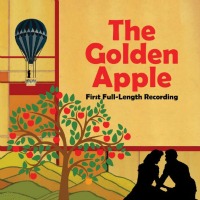 Lyric Stage Cast, 2015 (PS Classics, 2CDs)
Lyric Stage Cast, 2015 (PS Classics, 2CDs)  (4 / 5) At last. The New York City Center Encores! series didn’t get around to The Golden Apple until May 2017, but the Lyric Stage of Irving, Texas beat them by two and a half years. This live recording of that production, culled from four performances in the fall of 2014, fully captures the work’s brilliance and one-of-a-kindness. It’s close to note-complete, beautifully engineered, and splendidly conducted by Jay Dias. It includes the superior original finale, which the Broadway show and cast album producers scuttled in favor of a more audience-friendly reprise of “It’s the Going Home Together.” And the cast of unknowns is mostly terrific. Christopher J. Deaton’s performance as Ulysses is as well acted as it is sung, and Kristen Lassiter as Penelope does wonderfully by “Wind Flowers.” Danielle Estes’ Helen isn’t as earthy as Kaye Ballard’s, but she’s fine and flirty. James Williams has the right attitude for Hector, if not much voice and a tendency to overindulge in Sprechstimme. The orchestrations by Moross and Hershy Kay never sounded so glorious, and the live recording is clear down to the last lyric, though the placid audience seems to be missing a lot of the jokes. Latouche’s genius required so full a recording to be truly appreciated, as did Moross’s unique musical vocabulary (he really liked flatted sevenths). The complete libretto is included in the CD package, as are several appreciative essays. If this isn’t a perfect Golden Apple cast album, it’s very good, and the best we’re likely to get. — M.M.
(4 / 5) At last. The New York City Center Encores! series didn’t get around to The Golden Apple until May 2017, but the Lyric Stage of Irving, Texas beat them by two and a half years. This live recording of that production, culled from four performances in the fall of 2014, fully captures the work’s brilliance and one-of-a-kindness. It’s close to note-complete, beautifully engineered, and splendidly conducted by Jay Dias. It includes the superior original finale, which the Broadway show and cast album producers scuttled in favor of a more audience-friendly reprise of “It’s the Going Home Together.” And the cast of unknowns is mostly terrific. Christopher J. Deaton’s performance as Ulysses is as well acted as it is sung, and Kristen Lassiter as Penelope does wonderfully by “Wind Flowers.” Danielle Estes’ Helen isn’t as earthy as Kaye Ballard’s, but she’s fine and flirty. James Williams has the right attitude for Hector, if not much voice and a tendency to overindulge in Sprechstimme. The orchestrations by Moross and Hershy Kay never sounded so glorious, and the live recording is clear down to the last lyric, though the placid audience seems to be missing a lot of the jokes. Latouche’s genius required so full a recording to be truly appreciated, as did Moross’s unique musical vocabulary (he really liked flatted sevenths). The complete libretto is included in the CD package, as are several appreciative essays. If this isn’t a perfect Golden Apple cast album, it’s very good, and the best we’re likely to get. — M.M.
Godspell
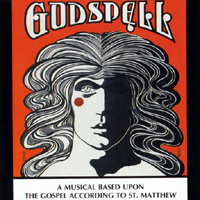 Original Off-Broadway Cast, 1971 (Bell-Arista)
Original Off-Broadway Cast, 1971 (Bell-Arista)  (5 / 5) Conceived and originally directed by John-Michael Tebelak, based on the Gospel according to St. Matthew, with music and new lyrics by Stephen Schwartz, Godspell was for many years a perennial on the stock, amateur, college, and high-school theater circuit, and by now has achieved the status of a modern musical theater classic. The show’s wonderfully tuneful songs have a simple beauty that makes them sound like old friends even upon first meeting. The cast of this original recording is strong, so it’s surprising to realize that not one of these performers went on to a significant musical theater career. Stephen Nathan sings the role of Jesus in an oddly smoky but appealing voice, and David Haskell is a vivid presence as Judas/John the Baptist. Robin Lamont’s lovely, plaintive recording of “Day By Day” became a popular hit. Lamar Alford compellingly sings the glorious thanksgiving anthem “All Good Gifts” in a voice with a dark, full, vibrato-laden timbre that doesn’t blend all that well with the voices of the rest of the ensemble. Another especially beautiful song is “By My Side,” written not by Schwartz but by cast member Peggy Gordon with Jay Hamburger; it’s given a moving rendition by Gordon, beautifully harmonizing with Gilmer McCormick. Joanne Jonas (“Bless the Lord”), Jeffrey Mylett (“We Beseech Thee”), Sonia Manzano (“Turn Back, O Man”), and Herb Braha (“Light of the World”) round out the talented cast. The excellent band consists of Steve Reinhardt on keyboards, Jesse Cutler on acoustic and lead guitar, Richard LaBonte on bass, and Ricky Shutter on drums and percussion; these first three sing the heartbreaking “On the Willows” as Jesus and his disciples say their final goodbyes to one another. Godspell is one of the very best of the seminal rock musicals of its era. — Michael Portantiere
(5 / 5) Conceived and originally directed by John-Michael Tebelak, based on the Gospel according to St. Matthew, with music and new lyrics by Stephen Schwartz, Godspell was for many years a perennial on the stock, amateur, college, and high-school theater circuit, and by now has achieved the status of a modern musical theater classic. The show’s wonderfully tuneful songs have a simple beauty that makes them sound like old friends even upon first meeting. The cast of this original recording is strong, so it’s surprising to realize that not one of these performers went on to a significant musical theater career. Stephen Nathan sings the role of Jesus in an oddly smoky but appealing voice, and David Haskell is a vivid presence as Judas/John the Baptist. Robin Lamont’s lovely, plaintive recording of “Day By Day” became a popular hit. Lamar Alford compellingly sings the glorious thanksgiving anthem “All Good Gifts” in a voice with a dark, full, vibrato-laden timbre that doesn’t blend all that well with the voices of the rest of the ensemble. Another especially beautiful song is “By My Side,” written not by Schwartz but by cast member Peggy Gordon with Jay Hamburger; it’s given a moving rendition by Gordon, beautifully harmonizing with Gilmer McCormick. Joanne Jonas (“Bless the Lord”), Jeffrey Mylett (“We Beseech Thee”), Sonia Manzano (“Turn Back, O Man”), and Herb Braha (“Light of the World”) round out the talented cast. The excellent band consists of Steve Reinhardt on keyboards, Jesse Cutler on acoustic and lead guitar, Richard LaBonte on bass, and Ricky Shutter on drums and percussion; these first three sing the heartbreaking “On the Willows” as Jesus and his disciples say their final goodbyes to one another. Godspell is one of the very best of the seminal rock musicals of its era. — Michael Portantiere
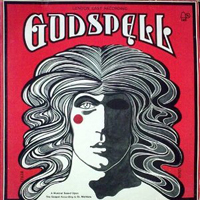 Original London Cast, 1972 (Bell-Arista/no CD)
Original London Cast, 1972 (Bell-Arista/no CD)  (3 / 5) Because the tune stack and the arrangements are virtually the same, this Godspell sounds very much like the Off-Broadway recording, except for the singers’ British accents and their different vocal qualities as compared to the original New York company. The cast includes Jeremy Irons, who eventually became a movie star and only rarely returned to musical theater (e.g., as Henry Higgins in a studio cast recording of My Fair Lady and as Fredrik in a New York City Opera production of A Little Night Music), as Judas/John the Baptist. Three more future names in the company are David Essex (as Jesus), Marti Webb, and Julie Covington, who would go on to sing the title role on the concept recording of Evita. All of the above, including Irons, give fine vocal performances here, though Essex’s renditions of Jesus’s songs may strike some listeners as a bit smarmy. Several lines of spoken dialogue included on this long out-of-print recording help to lend it a certain theatricality. — M.P.
(3 / 5) Because the tune stack and the arrangements are virtually the same, this Godspell sounds very much like the Off-Broadway recording, except for the singers’ British accents and their different vocal qualities as compared to the original New York company. The cast includes Jeremy Irons, who eventually became a movie star and only rarely returned to musical theater (e.g., as Henry Higgins in a studio cast recording of My Fair Lady and as Fredrik in a New York City Opera production of A Little Night Music), as Judas/John the Baptist. Three more future names in the company are David Essex (as Jesus), Marti Webb, and Julie Covington, who would go on to sing the title role on the concept recording of Evita. All of the above, including Irons, give fine vocal performances here, though Essex’s renditions of Jesus’s songs may strike some listeners as a bit smarmy. Several lines of spoken dialogue included on this long out-of-print recording help to lend it a certain theatricality. — M.P.
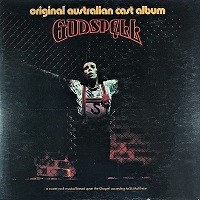 Original Australian Cast, 1972 (Festival/no CD)
Original Australian Cast, 1972 (Festival/no CD)  (1 / 5) Incredibly, no record label is listed anywhere on the LP copy of this album in this reviewer’s possession — the “Festival” name was found somewhere online, but it could be incorrect — and, apparently, the recording is not commercially available in the digital domain. The instrumental component of the performance is fine throughout, but the singing is generally mediocre when it’s not execrable; the album begins with a fellow named John Waters poorly singing “Prepare Yet the Way of the Lord” at a far slower tempo than appropriate, then goes on to offer us Christopher Pate’s prosaic rendition of “Save the People,” Colleen Hewett’s vibrato-heavy “Day by Day,” Jillian Archer’s pitch-approximate attempt at “Bless the Lord,” Domenic Luca’s blunt and shouty interpretation of “All Good Gifts,” Colette Mann’s witless “Turn Back, O Man,” and Rob Ellis’s wobbly “On the Willows” solo. Not to be found on the recording is “Alas for You,” presumably because Pate as Jesus just didn’t have the chops for it. Searching for bright spots, you’ll hear that Paul Reid Roman brings solid vocalism to “We Beseech Thee,” and also gleaming like a relative diamond in the rough is a mostly lovely rendition of “By My Side” led by Mann and Hewett — but even here, there are a few moments of questionable intonation. Perhaps the lack of any record label identification for this release was purposeful, out of embarrassment? — M.P.
(1 / 5) Incredibly, no record label is listed anywhere on the LP copy of this album in this reviewer’s possession — the “Festival” name was found somewhere online, but it could be incorrect — and, apparently, the recording is not commercially available in the digital domain. The instrumental component of the performance is fine throughout, but the singing is generally mediocre when it’s not execrable; the album begins with a fellow named John Waters poorly singing “Prepare Yet the Way of the Lord” at a far slower tempo than appropriate, then goes on to offer us Christopher Pate’s prosaic rendition of “Save the People,” Colleen Hewett’s vibrato-heavy “Day by Day,” Jillian Archer’s pitch-approximate attempt at “Bless the Lord,” Domenic Luca’s blunt and shouty interpretation of “All Good Gifts,” Colette Mann’s witless “Turn Back, O Man,” and Rob Ellis’s wobbly “On the Willows” solo. Not to be found on the recording is “Alas for You,” presumably because Pate as Jesus just didn’t have the chops for it. Searching for bright spots, you’ll hear that Paul Reid Roman brings solid vocalism to “We Beseech Thee,” and also gleaming like a relative diamond in the rough is a mostly lovely rendition of “By My Side” led by Mann and Hewett — but even here, there are a few moments of questionable intonation. Perhaps the lack of any record label identification for this release was purposeful, out of embarrassment? — M.P.
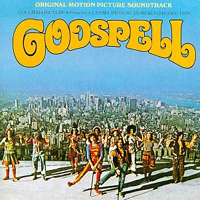 Film Soundtrack, 1973 (Bell-Arista)
Film Soundtrack, 1973 (Bell-Arista)  (4 / 5) With several of the performers and all of the musicians from the original Off-Broadway production on hand, augmented occasionally by additional musicians playing instruments such as violins, harp, and trombones, this recording also sounds a lot like the first one, with a few notable differences. As Jesus, Victor Garber has a sweeter and fuller voice than Stephen Nathan. Lynn Thigpen brings a more authentic gospel style to “Bless the Lord” than her predecessors, and Merrell Jackson beautifully sings “All Good Gifts” as a lyrical pop ballad rather than the anthem it became in Lamar Alford’s voice. Joanne Jonas, having had “Bless The Lord” taken away from her, instead offers a very funny take on “Turn Back, O Man.” One new song has been added: “Beautiful City,” here performed as a joyously hopeful chorale. Filmed on deserted Manhattan streets, the Godspell movie is rather hard to watch today because it prominently features the World Trade Center in its opening shot and in the “All for the Best” number. But this recording definitely has its pleasures. — M.P.
(4 / 5) With several of the performers and all of the musicians from the original Off-Broadway production on hand, augmented occasionally by additional musicians playing instruments such as violins, harp, and trombones, this recording also sounds a lot like the first one, with a few notable differences. As Jesus, Victor Garber has a sweeter and fuller voice than Stephen Nathan. Lynn Thigpen brings a more authentic gospel style to “Bless the Lord” than her predecessors, and Merrell Jackson beautifully sings “All Good Gifts” as a lyrical pop ballad rather than the anthem it became in Lamar Alford’s voice. Joanne Jonas, having had “Bless The Lord” taken away from her, instead offers a very funny take on “Turn Back, O Man.” One new song has been added: “Beautiful City,” here performed as a joyously hopeful chorale. Filmed on deserted Manhattan streets, the Godspell movie is rather hard to watch today because it prominently features the World Trade Center in its opening shot and in the “All for the Best” number. But this recording definitely has its pleasures. — M.P.
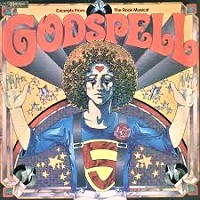 London Studio Cast, 1973 (Pickwick/no CD) No stars; not recommended. In addition to cast albums of stage productions, some of the most popular musicals have received multiple studio cast recordings, often issued on budget labels with little-known or virtually unknown singers. Generally speaking, this website eschews reviews of these items, which tend to remain in print only for short periods of time and are thereafter difficult to obtain. But we’re making an exception here, because this London studio cast album of Godspell is so extraordinary in its breathtaking awfulness. The LP is billed as offering “excerpts from the rock musical” — truth in advertising, since “All Good Gifts,” “Learn Your Lessons Well,” “Alas For You,” “On the Willows,” and the finale are nowhere to be found. You won’t miss them here, because the songs included are pitifully performed in terms of the quality of most of the voices, the shockingly ragged ensemble, and the fact that the singers are so frequently and so wildly out of tune as to make you gasp. For one of many examples, the beginning of “Light of the World” is such a debacle in terms of both pitch and ensemble that you’ll find it hard to believe the track was ever released on a commercial recording. Mercifully in this case, none of the singers are credited, nor is anyone else who was involved in this godawful enterprise. For that matter, composer-lyricist Stephen Schwartz’s name appears only once on the album cover, in the poorly written liner notes; and although the beautiful “By My Side” is included in the song stack, there’s no mention of the fact that it was written not by Schwartz but by Peggy Gordon and Jay Hamburger. One has to wonder if this recording was duly licensed and the rights paid for, or if it was made and released under the radar in the hope that Schwartz et al. would somehow not notice. Epic fail. — M.P.
London Studio Cast, 1973 (Pickwick/no CD) No stars; not recommended. In addition to cast albums of stage productions, some of the most popular musicals have received multiple studio cast recordings, often issued on budget labels with little-known or virtually unknown singers. Generally speaking, this website eschews reviews of these items, which tend to remain in print only for short periods of time and are thereafter difficult to obtain. But we’re making an exception here, because this London studio cast album of Godspell is so extraordinary in its breathtaking awfulness. The LP is billed as offering “excerpts from the rock musical” — truth in advertising, since “All Good Gifts,” “Learn Your Lessons Well,” “Alas For You,” “On the Willows,” and the finale are nowhere to be found. You won’t miss them here, because the songs included are pitifully performed in terms of the quality of most of the voices, the shockingly ragged ensemble, and the fact that the singers are so frequently and so wildly out of tune as to make you gasp. For one of many examples, the beginning of “Light of the World” is such a debacle in terms of both pitch and ensemble that you’ll find it hard to believe the track was ever released on a commercial recording. Mercifully in this case, none of the singers are credited, nor is anyone else who was involved in this godawful enterprise. For that matter, composer-lyricist Stephen Schwartz’s name appears only once on the album cover, in the poorly written liner notes; and although the beautiful “By My Side” is included in the song stack, there’s no mention of the fact that it was written not by Schwartz but by Peggy Gordon and Jay Hamburger. One has to wonder if this recording was duly licensed and the rights paid for, or if it was made and released under the radar in the hope that Schwartz et al. would somehow not notice. Epic fail. — M.P.
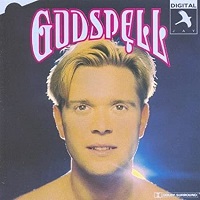 London Studio Cast, 1993 (JAY)
London Studio Cast, 1993 (JAY)  (4 / 5) Don’t be put off by the cover image, an “artfully” lit head shot of Darren Day as Jesus with his blond hair cut in a short, stylish way that makes him look more like a ’90s runway model than the Son of God. Supervised and conducted by Stephen Schwartz, this is an excellent recording of the complete score of Godspell, including what was apparently the first commercial recording of the “Tower of Babble” sequence that serves as the show’s prologue. Day displays a sweet, lyrical tenor in “Save the People,” yet he can muster the intensity necessary for “Alas for You,” and his performance of a wistful ballad version of “Beautiful City” with new lyrics is heartfelt. Glyn Kerslake brings a rich voice to “Prepare Ye,” while Jacqueline Dankworth offers a moving rendition of “Day by Day,” singing her solo parts at the beginning and end of the song in a soft, almost hushed tone but opening up when the ensemble joins in. Paul Manuel’s pretty if lightweight voice is certainly better suited to “All Good Gifts” than to the role of Tony in West Side Story, in which he disappoints on another JAY studio cast album. Samantha Shaw has a lot of fun with “Learn Your Lessons Well,” Clare Burt shows off powerful pipes in “Bless The Lord,” Clive Rowe does some exciting wailing and riffing in “Light of the World,” Ruthie Henshall is amusingly seductive in “Turn Back, O Man,” and the young John Barrowman brings his pleasing, well-focused tenor to “We Beseech Thee.” The overall sound quality of the recording is exemplary, allowing the arrangements and vocal harmonies to come through with full clarity as in the heartbreaking Peggy Gordon-Jay Hamburger song “By My Side,” beautifully sung here by Elizabeth Sastre, Jacqueline Dankworth, and company. — M.P.
(4 / 5) Don’t be put off by the cover image, an “artfully” lit head shot of Darren Day as Jesus with his blond hair cut in a short, stylish way that makes him look more like a ’90s runway model than the Son of God. Supervised and conducted by Stephen Schwartz, this is an excellent recording of the complete score of Godspell, including what was apparently the first commercial recording of the “Tower of Babble” sequence that serves as the show’s prologue. Day displays a sweet, lyrical tenor in “Save the People,” yet he can muster the intensity necessary for “Alas for You,” and his performance of a wistful ballad version of “Beautiful City” with new lyrics is heartfelt. Glyn Kerslake brings a rich voice to “Prepare Ye,” while Jacqueline Dankworth offers a moving rendition of “Day by Day,” singing her solo parts at the beginning and end of the song in a soft, almost hushed tone but opening up when the ensemble joins in. Paul Manuel’s pretty if lightweight voice is certainly better suited to “All Good Gifts” than to the role of Tony in West Side Story, in which he disappoints on another JAY studio cast album. Samantha Shaw has a lot of fun with “Learn Your Lessons Well,” Clare Burt shows off powerful pipes in “Bless The Lord,” Clive Rowe does some exciting wailing and riffing in “Light of the World,” Ruthie Henshall is amusingly seductive in “Turn Back, O Man,” and the young John Barrowman brings his pleasing, well-focused tenor to “We Beseech Thee.” The overall sound quality of the recording is exemplary, allowing the arrangements and vocal harmonies to come through with full clarity as in the heartbreaking Peggy Gordon-Jay Hamburger song “By My Side,” beautifully sung here by Elizabeth Sastre, Jacqueline Dankworth, and company. — M.P.
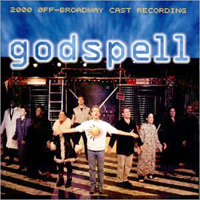 Off-Broadway Cast, 2000 (Fynsworth Alley)
Off-Broadway Cast, 2000 (Fynsworth Alley)  (4 / 5) Here’s a terrific recording of a very well-sung, hilariously funny, deeply moving production of Godspell that started out Off-Off-Broadway under the aegis of a group called the Third Eye Repertory and later had an Off-Broadway run in the Theater at Saint Peter’s Church. The show boasted a wonderful cast, intelligent direction by Shawn Rozsa, and sensitive musical direction by Dan Schachner. Barrett Foa’s clear, strong, youthful tenor is well suited to the role of Jesus. As Judas/John the Baptist, Will Erat adapts his full, rounded, legit voice to a pop/rock idiom impressively; he was wisely handed the haunting “On the Willows” to sing in this production. Other highlights: Catherine Carpenter’s “Day by Day” is warm and sincere, Capathia Jenkins’ “Turn Back, a Man” is great fun, Shoshana Bean’s “Bless the Lord” is a roof-raiser, and Eliseo Roman deserves a special nod for his gorgeous singing of “All Good Gifts.” All of the “Tower of Babble” sequence is included, and Foa leads the cast in a beautiful ballad version of “Beautiful City” with new lyrics that were originally written in response to the Rodney King riots in Los Angeles but now also seem movingly prescient of the 9/11/2001 attacks on the World Trace Center in NYC: “Out of the ruins and rubble, out of the smoke, out of our night of struggle, can we see a ray of hope?” — M.P.
(4 / 5) Here’s a terrific recording of a very well-sung, hilariously funny, deeply moving production of Godspell that started out Off-Off-Broadway under the aegis of a group called the Third Eye Repertory and later had an Off-Broadway run in the Theater at Saint Peter’s Church. The show boasted a wonderful cast, intelligent direction by Shawn Rozsa, and sensitive musical direction by Dan Schachner. Barrett Foa’s clear, strong, youthful tenor is well suited to the role of Jesus. As Judas/John the Baptist, Will Erat adapts his full, rounded, legit voice to a pop/rock idiom impressively; he was wisely handed the haunting “On the Willows” to sing in this production. Other highlights: Catherine Carpenter’s “Day by Day” is warm and sincere, Capathia Jenkins’ “Turn Back, a Man” is great fun, Shoshana Bean’s “Bless the Lord” is a roof-raiser, and Eliseo Roman deserves a special nod for his gorgeous singing of “All Good Gifts.” All of the “Tower of Babble” sequence is included, and Foa leads the cast in a beautiful ballad version of “Beautiful City” with new lyrics that were originally written in response to the Rodney King riots in Los Angeles but now also seem movingly prescient of the 9/11/2001 attacks on the World Trace Center in NYC: “Out of the ruins and rubble, out of the smoke, out of our night of struggle, can we see a ray of hope?” — M.P.
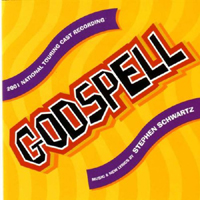 National Touring Cast, 2001 (DRG)
National Touring Cast, 2001 (DRG)  (1 / 5) In place of the original guitar-and piano-based arrangements, there’s a whole lotta synth to be heard on this cast album of a 2001 Godspell tour. That approach works well in the opening “Tower of Babble” ensemble, but some listeners will soon find themselves yearning for the simpler, more natural and melodious sounds of previous recordings. Scott Schwartz — son of Stephen Schwartz, and the director of this production — wanted the flavors of alternative rock and folk-rock artists to be evoked by Alex Lacamoire’s new orchestrations and arrangements. Whether or not that goal was achieved and the score is better for it is a matter of opinion. Joe Carney shows off a strong, sexy voice as Jesus, but he seems to lose the beat at the top of “Save the People,” and he sounds off pitch in “Alas for You” — although the latter may be partly due to the weird, shifting harmonics in the new arrangements, which similarly work against the other cast member in other numbers. Jessica Carter has a lot of trouble zeroing in on the correct notes in “Turn Back, O Man,” and she annoyingly sings “whose head is crowned with flames,” rather than “…flame,” thereby wrecking the rhyme with “proclaim.” One of the best cuts on the recording is a terrific, uptempo version of “Beautiful City” led by Carney and Michael Yuen, but overall, this is one of the least commendable of all the Godspell albums. — M.P.
(1 / 5) In place of the original guitar-and piano-based arrangements, there’s a whole lotta synth to be heard on this cast album of a 2001 Godspell tour. That approach works well in the opening “Tower of Babble” ensemble, but some listeners will soon find themselves yearning for the simpler, more natural and melodious sounds of previous recordings. Scott Schwartz — son of Stephen Schwartz, and the director of this production — wanted the flavors of alternative rock and folk-rock artists to be evoked by Alex Lacamoire’s new orchestrations and arrangements. Whether or not that goal was achieved and the score is better for it is a matter of opinion. Joe Carney shows off a strong, sexy voice as Jesus, but he seems to lose the beat at the top of “Save the People,” and he sounds off pitch in “Alas for You” — although the latter may be partly due to the weird, shifting harmonics in the new arrangements, which similarly work against the other cast member in other numbers. Jessica Carter has a lot of trouble zeroing in on the correct notes in “Turn Back, O Man,” and she annoyingly sings “whose head is crowned with flames,” rather than “…flame,” thereby wrecking the rhyme with “proclaim.” One of the best cuts on the recording is a terrific, uptempo version of “Beautiful City” led by Carney and Michael Yuen, but overall, this is one of the least commendable of all the Godspell albums. — M.P.
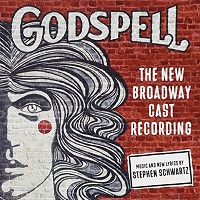 Broadway Cast, 2012 (Ghostlight)
Broadway Cast, 2012 (Ghostlight)  (4 / 5) Many of the joys of the Broadway revival of Godspell were related to the show’s inventive, bursting-with-energy staging by director Daniel Goldstein and choreographer Christopher Gattelli in a modified in-the-round setup at the Circle in the Square Theatre; but the musical pleasures of the production were also abundant, so the cast album is a worthy edition to the discography. Let’s credit first the wonderful new orchestrations and vocal arrangements by Michael Holland — quite different overall from anything that had been heard before in this score, but not jarringly so as in the recording reviewed immediately above, and still happily hewing to traditional lines in terms of being very much acoustic-based. In the role of Jesus, Hunter Parrish doesn’t deliver the strong high notes one might have wished for in “Alas for You,” but most of his singing is very beautiful in a contemporary rock ballad style, and his achingly wistful rendition of “Beautiful City” is deeply moving. Wallace Smith is perfectly cast vocally as Judas/John the Baptist, and among the balance of the company, some of the standouts in solo moments are Nick Blaemire (“We Beseech Thee”), Telly Leung (“All Good Gifts”), Lindsay Mendez (“Bless the Lord”), Anna Maria Perez de Tagle (“Day by Day”), and Uzo Aduba (“By My Side”). — M.P.
(4 / 5) Many of the joys of the Broadway revival of Godspell were related to the show’s inventive, bursting-with-energy staging by director Daniel Goldstein and choreographer Christopher Gattelli in a modified in-the-round setup at the Circle in the Square Theatre; but the musical pleasures of the production were also abundant, so the cast album is a worthy edition to the discography. Let’s credit first the wonderful new orchestrations and vocal arrangements by Michael Holland — quite different overall from anything that had been heard before in this score, but not jarringly so as in the recording reviewed immediately above, and still happily hewing to traditional lines in terms of being very much acoustic-based. In the role of Jesus, Hunter Parrish doesn’t deliver the strong high notes one might have wished for in “Alas for You,” but most of his singing is very beautiful in a contemporary rock ballad style, and his achingly wistful rendition of “Beautiful City” is deeply moving. Wallace Smith is perfectly cast vocally as Judas/John the Baptist, and among the balance of the company, some of the standouts in solo moments are Nick Blaemire (“We Beseech Thee”), Telly Leung (“All Good Gifts”), Lindsay Mendez (“Bless the Lord”), Anna Maria Perez de Tagle (“Day by Day”), and Uzo Aduba (“By My Side”). — M.P.
Goblin Market
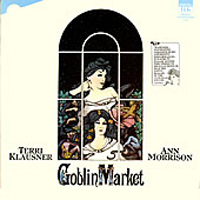 Original Off-Broadway Cast, 1996 (JAY)
Original Off-Broadway Cast, 1996 (JAY)  (2 / 5) Goblin Market was a snob hit of the 1985-86 Off-Broadway season. Based on a fairy tale in verse by the pre-Raphaelite Christina G. Rossetti, this two-character “music theater piece” was the public’s introduction to composer Polly Pen. With a libretto by Pen and Peggy Harmon, Goblin Market premiered at the Vineyard Theatre, which had commissioned it. That staging, directed by André Ernotte, subsequently transferred to Circle in the Square. Rossetti’s lengthy poem concerns two young sisters, the bold Laura and the fainthearted Lizzie, who are tempted by specters proffering fruits that are luscious-looking but dangerous. Written in 1862, the poem is an angst-driven fantasy of early Victorian sexual wish fulfillment; Pen and Harmon transformed it into a story of grown-up siblings who visit the nursery of their childhood to ponder their developmental years from an adult perspective. The score, which reflects a variety of influences from baroque vocal literature to 19th-century parlor songs and 20th-century theater music, often matches the morbidity of Rossetti’s verse. Pen has a knack for creating tonal configurations and rhythmic patterns that seem anodyne until, repeated as themes, they reveal an eccentric complexity and burrow into the listener’s consciousness. On the recording, Terri Klausner as Laura and Ann Morrison as Lizzie handle the arias with vivid expressiveness and musical accuracy. James McElwaine’s orchestrations, although performed by a combo of only four, lend a cello-rich heft to the delicate melodies. In the years since Goblin Market, Pen has been showered with awards and grants. Her well-deserved success illustrates how effectively the nonprofit resident theater system and charitable funding for the arts have combined, despite attacks from the political right, to nurture a branch of American musical theater that has no connection to mainstream tastes. — Charles Wright
(2 / 5) Goblin Market was a snob hit of the 1985-86 Off-Broadway season. Based on a fairy tale in verse by the pre-Raphaelite Christina G. Rossetti, this two-character “music theater piece” was the public’s introduction to composer Polly Pen. With a libretto by Pen and Peggy Harmon, Goblin Market premiered at the Vineyard Theatre, which had commissioned it. That staging, directed by André Ernotte, subsequently transferred to Circle in the Square. Rossetti’s lengthy poem concerns two young sisters, the bold Laura and the fainthearted Lizzie, who are tempted by specters proffering fruits that are luscious-looking but dangerous. Written in 1862, the poem is an angst-driven fantasy of early Victorian sexual wish fulfillment; Pen and Harmon transformed it into a story of grown-up siblings who visit the nursery of their childhood to ponder their developmental years from an adult perspective. The score, which reflects a variety of influences from baroque vocal literature to 19th-century parlor songs and 20th-century theater music, often matches the morbidity of Rossetti’s verse. Pen has a knack for creating tonal configurations and rhythmic patterns that seem anodyne until, repeated as themes, they reveal an eccentric complexity and burrow into the listener’s consciousness. On the recording, Terri Klausner as Laura and Ann Morrison as Lizzie handle the arias with vivid expressiveness and musical accuracy. James McElwaine’s orchestrations, although performed by a combo of only four, lend a cello-rich heft to the delicate melodies. In the years since Goblin Market, Pen has been showered with awards and grants. Her well-deserved success illustrates how effectively the nonprofit resident theater system and charitable funding for the arts have combined, despite attacks from the political right, to nurture a branch of American musical theater that has no connection to mainstream tastes. — Charles Wright
The Girl Who Came to Supper
 Original Broadway Cast, 1963 (Columbia/Sony)
Original Broadway Cast, 1963 (Columbia/Sony)  (3 / 5) This Cinderella story is set during the coronation of George V, adapted by Harry Kurnitz (book) and Noël Coward (music and lyrics) from Terence Rattigan’s The Sleeping Prince. As the libidinous Prince Regent of Carpathia, José Ferrer is a gloomy presence on the cast album, with his post-nasal-drip baritone and his singular lack of charm. As the American chorus girl in London who attracts his royal eye, Florence Henderson hits all the notes and has one wonderful showpiece, “The Coconut Girl,” in which she performs an entire, ridiculous, period musical comedy in under eight minutes. But Henderson is a bit too on-the-nose, capable without idiosyncrasy. So this unlikely couple’s doomed affair doesn’t resonate as it should. However, the score itself is woefully underrated. Sir Noël contributed a cart full of appealing ballads, elegant waltzes, and satirical numbers, the latter exhibiting his customary lyrical sangfroid. He even whipped up an 11-minute music-hall sequence for Tessie O’Shea, utterly irrelevant to the action but so fetching that O’Shea collected a Tony Award for her performance. Listen carefully to Sony’s CD, which rearranges the tracks from the LP into their proper stage order, and you’ll hear a big, old-fashioned show crashing as it docks in Manhattan. But if you step back just a bit, it emerges as a warm, witty musical with, unfortunately, two romantic leads who were not made for each other. (Note: Coward may be heard singing the show’s songs himself, including several cut numbers, on the DRG disc Noël Coward Sings His Score for The Girl Who Came to Supper. If anything, he makes a better case for the property than does the cast album.) — Marc Miller
(3 / 5) This Cinderella story is set during the coronation of George V, adapted by Harry Kurnitz (book) and Noël Coward (music and lyrics) from Terence Rattigan’s The Sleeping Prince. As the libidinous Prince Regent of Carpathia, José Ferrer is a gloomy presence on the cast album, with his post-nasal-drip baritone and his singular lack of charm. As the American chorus girl in London who attracts his royal eye, Florence Henderson hits all the notes and has one wonderful showpiece, “The Coconut Girl,” in which she performs an entire, ridiculous, period musical comedy in under eight minutes. But Henderson is a bit too on-the-nose, capable without idiosyncrasy. So this unlikely couple’s doomed affair doesn’t resonate as it should. However, the score itself is woefully underrated. Sir Noël contributed a cart full of appealing ballads, elegant waltzes, and satirical numbers, the latter exhibiting his customary lyrical sangfroid. He even whipped up an 11-minute music-hall sequence for Tessie O’Shea, utterly irrelevant to the action but so fetching that O’Shea collected a Tony Award for her performance. Listen carefully to Sony’s CD, which rearranges the tracks from the LP into their proper stage order, and you’ll hear a big, old-fashioned show crashing as it docks in Manhattan. But if you step back just a bit, it emerges as a warm, witty musical with, unfortunately, two romantic leads who were not made for each other. (Note: Coward may be heard singing the show’s songs himself, including several cut numbers, on the DRG disc Noël Coward Sings His Score for The Girl Who Came to Supper. If anything, he makes a better case for the property than does the cast album.) — Marc Miller
The Girl in Pink Tights
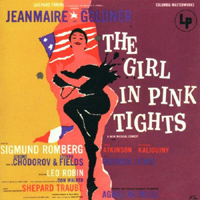 Original Broadway Cast, 1954 (ColumbialDRG)
Original Broadway Cast, 1954 (ColumbialDRG)  (4 / 5) Sigmund Romberg worked as a staff writer for the Shuberts, churning out 22 scores from 1914 through 1918 alone! Following his indentured servitude, he went on to compose such smash hits as Blossom Time, The Student Prince, and The Desert Song. In the 1940s, when his form of operetta had become passé, he changed gears and surprised everyone with a beautiful score (with lyrics by Dorothy Fields) for Up in Central Park. His next musical was a flop, but then a new Romberg score hit Broadway when The Girl in Pink Tights opened in 1954. The show ran only 115 performances, but what astounded theatergoers was that the composer had died in 1951. With jottings of an unfinished Romberg score having been found after his death, producer Anthony Brady Farrell had hired orchestrator Don Walker to complete the music. Walker admitted that there might have been more Walker than Romberg in the finished product, but the score is a delight. The show is a fictionalized look at the creation of the 19th-century melodrama spectacle The Black Crook. The comic numbers are its standouts, thanks to lyricist Leo Robin (best known for Gentlemen Prefer Blondes). Robin skewered the acting profession in such hilarious songs as “We’re All in the Same Boat” and “You’ve Got to Be a Little Crazy.” The hit song was “Lost in Loveliness,” but equally fine are the ballads “In Paris and in Love” and “My Heart Won’t Say Goodbye.” Charles Goldner, Brenda Lewis, Jeanmaire, and David Atkinson shine in their numbers; deep down in the cast list you’ll find Marni Nixon, Ted Thurston, Joshua Shelley, Dania Krupska, and Gregory and Maurice Hines. The Girl in Pink Tights is highly enjoyable for its beautiful Romberg melodies and witty, sophisticated Robin lyrics. The cast album’s riches are all the more exciting as the final work of a great composer. — Ken Bloom
(4 / 5) Sigmund Romberg worked as a staff writer for the Shuberts, churning out 22 scores from 1914 through 1918 alone! Following his indentured servitude, he went on to compose such smash hits as Blossom Time, The Student Prince, and The Desert Song. In the 1940s, when his form of operetta had become passé, he changed gears and surprised everyone with a beautiful score (with lyrics by Dorothy Fields) for Up in Central Park. His next musical was a flop, but then a new Romberg score hit Broadway when The Girl in Pink Tights opened in 1954. The show ran only 115 performances, but what astounded theatergoers was that the composer had died in 1951. With jottings of an unfinished Romberg score having been found after his death, producer Anthony Brady Farrell had hired orchestrator Don Walker to complete the music. Walker admitted that there might have been more Walker than Romberg in the finished product, but the score is a delight. The show is a fictionalized look at the creation of the 19th-century melodrama spectacle The Black Crook. The comic numbers are its standouts, thanks to lyricist Leo Robin (best known for Gentlemen Prefer Blondes). Robin skewered the acting profession in such hilarious songs as “We’re All in the Same Boat” and “You’ve Got to Be a Little Crazy.” The hit song was “Lost in Loveliness,” but equally fine are the ballads “In Paris and in Love” and “My Heart Won’t Say Goodbye.” Charles Goldner, Brenda Lewis, Jeanmaire, and David Atkinson shine in their numbers; deep down in the cast list you’ll find Marni Nixon, Ted Thurston, Joshua Shelley, Dania Krupska, and Gregory and Maurice Hines. The Girl in Pink Tights is highly enjoyable for its beautiful Romberg melodies and witty, sophisticated Robin lyrics. The cast album’s riches are all the more exciting as the final work of a great composer. — Ken Bloom
The Girl Friend
 Original U.K. Cast, 1987 (TER/no CD)
Original U.K. Cast, 1987 (TER/no CD)  (1 / 5) One of five Rodgers and Hart shows to open in 1926, The Girl Friend had a healthy run. In 1937, the show hit London, where two British writers, R. P. Weston and Bert Lee, replaced Herbert Fields’ entire original book with a new plot from a comedy called Kitty’s Kisses, which had been adapted as a London musical a year earlier. Most of the score was replaced with songs by Gus Kahn, Con Conrad, Will Donaldson, and Otto Harbach. Clear so far? A new version of this version was produced in Colchester, England, in 1987, with the old British script rewritten by director Michael Winter; it had a few Rodgers and Hart songs, plus some tunes that has been written by others for the 1927 production. In all, this cast album contains only three songs from The Girl Friend as originally staged on Broadway, plus a number that was cut during tryouts, two R&H songs from other shows, and four songs that, according to the credits on the album jacket, were collaborations of Rodgers, Hart, and Kahn. The cast is lackluster, and the orchestrations are distractingly busy. The original score’s biggest hits, “The Blue Room” and the title song, are here joined by another R&H delight, “Mountain Greenery,” sung colorlessly by Barbara King and Mark Hutchinson. The rarely heard but appealing “Sleepyhead,” “What’s the Use of Talking?” and “Why Do I?” are also included. — David Wolf
(1 / 5) One of five Rodgers and Hart shows to open in 1926, The Girl Friend had a healthy run. In 1937, the show hit London, where two British writers, R. P. Weston and Bert Lee, replaced Herbert Fields’ entire original book with a new plot from a comedy called Kitty’s Kisses, which had been adapted as a London musical a year earlier. Most of the score was replaced with songs by Gus Kahn, Con Conrad, Will Donaldson, and Otto Harbach. Clear so far? A new version of this version was produced in Colchester, England, in 1987, with the old British script rewritten by director Michael Winter; it had a few Rodgers and Hart songs, plus some tunes that has been written by others for the 1927 production. In all, this cast album contains only three songs from The Girl Friend as originally staged on Broadway, plus a number that was cut during tryouts, two R&H songs from other shows, and four songs that, according to the credits on the album jacket, were collaborations of Rodgers, Hart, and Kahn. The cast is lackluster, and the orchestrations are distractingly busy. The original score’s biggest hits, “The Blue Room” and the title song, are here joined by another R&H delight, “Mountain Greenery,” sung colorlessly by Barbara King and Mark Hutchinson. The rarely heard but appealing “Sleepyhead,” “What’s the Use of Talking?” and “Why Do I?” are also included. — David Wolf
Girl Crazy
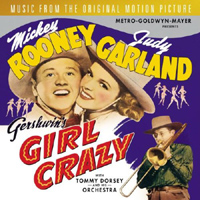 Film Soundtrack, 1943 (Rhino-Turner)
Film Soundtrack, 1943 (Rhino-Turner)  (3 / 5) It’s widely known that George and Ira Gershwin’s Girl Crazy has a terrific score, and that Ethel Merman made her legendary Broadway debut in the show singing “I Got Rhythm.” Many aficionados also know that Ginger Rogers, not Merman, was the heroine, and that the opening night pit orchestra included Benny Goodman, Glenn Miller, and Gene Krupa. No one, however, knows or wants to know the script; even for 1930, this was a loose assemblage of ethnic humor, stock situations, and leftover shreds from cowboy movies. Small wonder that the musical was so thoroughly rewritten for its one major Broadway revival that it needed a new title: Crazy for You (see separate review of the cast album under that title). Fortunately for home listeners, a timeless score matters far more than an unrevivable script. The property was filmed three times, never faithfully but twice with some interest. The 1943 version starred Mickey Rooney and Judy Garland in their vocal prime, as evidenced by this album of songs from the soundtrack. The duet “Could You Use Me?” is an outstanding Gershwin cut, and so is Garland’s sparkling “Embraceable You.” Nor does June Allyson, in her feature film debut, hold anything back in “Treat Me Rough.” The Tommy Dorsey Orchestra really swings out in “I Got Rhythm,” and any recording that features Garland singing a definitive “But Not for Me” has its own built-in justification. — Richard Barrios
(3 / 5) It’s widely known that George and Ira Gershwin’s Girl Crazy has a terrific score, and that Ethel Merman made her legendary Broadway debut in the show singing “I Got Rhythm.” Many aficionados also know that Ginger Rogers, not Merman, was the heroine, and that the opening night pit orchestra included Benny Goodman, Glenn Miller, and Gene Krupa. No one, however, knows or wants to know the script; even for 1930, this was a loose assemblage of ethnic humor, stock situations, and leftover shreds from cowboy movies. Small wonder that the musical was so thoroughly rewritten for its one major Broadway revival that it needed a new title: Crazy for You (see separate review of the cast album under that title). Fortunately for home listeners, a timeless score matters far more than an unrevivable script. The property was filmed three times, never faithfully but twice with some interest. The 1943 version starred Mickey Rooney and Judy Garland in their vocal prime, as evidenced by this album of songs from the soundtrack. The duet “Could You Use Me?” is an outstanding Gershwin cut, and so is Garland’s sparkling “Embraceable You.” Nor does June Allyson, in her feature film debut, hold anything back in “Treat Me Rough.” The Tommy Dorsey Orchestra really swings out in “I Got Rhythm,” and any recording that features Garland singing a definitive “But Not for Me” has its own built-in justification. — Richard Barrios
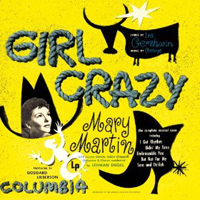 Studio Cast, 1951 (Columbia/Sony)
Studio Cast, 1951 (Columbia/Sony)  (1 / 5) The first studio cast recording of Girl Crazy is in no way a true reflection of the show; it might have better been titled “Mary Martin and Friends Sing Songs From Girl Crazy.” There is no theatricality here, simply an assured star blandly sailing through some favorite pieces. Martin is assisted by conductor Lehman Engel plus a chorus and supporting singers who evidently have no idea that the Gershwins intended these songs to have energy and fire. Even “Treat Me Rough” sounds laid-back! This, then, is the Muzak version of Girl Crazy, and only Martin completists need give it their attention. — R.B.
(1 / 5) The first studio cast recording of Girl Crazy is in no way a true reflection of the show; it might have better been titled “Mary Martin and Friends Sing Songs From Girl Crazy.” There is no theatricality here, simply an assured star blandly sailing through some favorite pieces. Martin is assisted by conductor Lehman Engel plus a chorus and supporting singers who evidently have no idea that the Gershwins intended these songs to have energy and fire. Even “Treat Me Rough” sounds laid-back! This, then, is the Muzak version of Girl Crazy, and only Martin completists need give it their attention. — R.B.
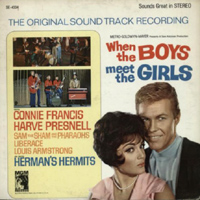 When the Boys Meet the Girls, Film Soundtrack, 1965 (MGM/no CD) No stars; not recommended. When Girl Crazy made it to the big screen for the third time, it was a humdrum effort retitled When the Boys Meet the Girls. The flick starred two enjoyable singers, Connie Francis and Harve Presnell, but neither the orchestrations nor the new material were worthy of their talents, let alone those of the brothers Gershwin. All that need be added about this soundtrack recording is that it certainly is unique: Liberace and Sam the Sham and the Pharaohs perform material that is not from the show, and where else could you find a rendition of “Bidin’ My Time” by Herman’s Hermits? — R.B.
When the Boys Meet the Girls, Film Soundtrack, 1965 (MGM/no CD) No stars; not recommended. When Girl Crazy made it to the big screen for the third time, it was a humdrum effort retitled When the Boys Meet the Girls. The flick starred two enjoyable singers, Connie Francis and Harve Presnell, but neither the orchestrations nor the new material were worthy of their talents, let alone those of the brothers Gershwin. All that need be added about this soundtrack recording is that it certainly is unique: Liberace and Sam the Sham and the Pharaohs perform material that is not from the show, and where else could you find a rendition of “Bidin’ My Time” by Herman’s Hermits? — R.B.
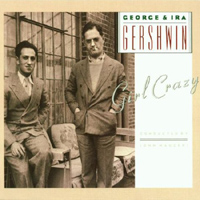 Studio Cast, 1990 (Nonesuch)
Studio Cast, 1990 (Nonesuch)  (4 / 5) Six decades after its first hearing, the Girl Crazy score was finally given something close to its due. This time, there was a reconstruction of the orchestrations, and there is an almost time-capsule feel to the performances, ably conducted by John Mauceri. Although the singers work hard, the casting is not all it should be, so it’s really the orchestra and the material that make this recording special. Judy Blazer is an attractive Molly, but the Danny of David-James Carroll (he later dropped the “-James”) is too much in the sensitive juvenile vein; this show does not need a Candide! The toughest role to cast, of course, is the dramatically extraneous, musically necessary part of Kate — the Merman role. The character’s songs have “self-assurance” written allover them from the very first note of “Sam and Delilah,” and although Merman’s type of brass isn’t necessarily a requirement, some sort of magic is. Lorna Luft tries and has good moments, but something more is needed. (Maybe Bernadette Peters or Donna Murphy could make these songs work without imitating Merman.) At least Mauceri and his musicians hold up their end unfailingly, and there’s a fun appendix included as well: “You’ve Got What Gets Me,” written by the Gershwins for the 1932 Girl Crazy film. This is a worthy recording that will serve well until something even better comes along. — R.B.
(4 / 5) Six decades after its first hearing, the Girl Crazy score was finally given something close to its due. This time, there was a reconstruction of the orchestrations, and there is an almost time-capsule feel to the performances, ably conducted by John Mauceri. Although the singers work hard, the casting is not all it should be, so it’s really the orchestra and the material that make this recording special. Judy Blazer is an attractive Molly, but the Danny of David-James Carroll (he later dropped the “-James”) is too much in the sensitive juvenile vein; this show does not need a Candide! The toughest role to cast, of course, is the dramatically extraneous, musically necessary part of Kate — the Merman role. The character’s songs have “self-assurance” written allover them from the very first note of “Sam and Delilah,” and although Merman’s type of brass isn’t necessarily a requirement, some sort of magic is. Lorna Luft tries and has good moments, but something more is needed. (Maybe Bernadette Peters or Donna Murphy could make these songs work without imitating Merman.) At least Mauceri and his musicians hold up their end unfailingly, and there’s a fun appendix included as well: “You’ve Got What Gets Me,” written by the Gershwins for the 1932 Girl Crazy film. This is a worthy recording that will serve well until something even better comes along. — R.B.
Gigi
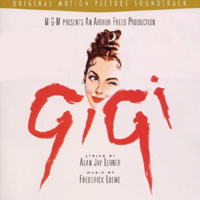 Film Soundtrack, 1958 (MGM/Rhino)
Film Soundtrack, 1958 (MGM/Rhino)  (5 / 5) This beloved Alan Jay Lerner-Frederick Loewe score is tremendously appealing, and the soundtrack album is one of the all-time great recordings of any screen or stage musical. Directed by Vincente Minnelli, Gigi won nine Academy Awards, including “Best Picture” of 1958. Time has been kind to this subtle adaptation of Colette’s novella; it holds up well even today as a great feminist story. Leslie Caron’s performance as Gigi adds believability and weight to the tale of a young girl who uses her intelligence and steadfastness of character to stand up against an entire society’s misguided conceptions of sex and marriage. But it’s the score that has made this film an enduring classic. Lerner’s lyrics are among his most brilliantly crafted, while Loewe’s dazzling music evokes Lehár, Ravel, and Brahms, even as the composer retains his own distinctive melodic voice. Conductor André Previn, Conrad Salinger, Bob Franklyn, Alexander Courage, and others came up with superb arrangements/orchestrations; the gorgeous counter-melodies of the French horns and the Offenbachesque staccatos of the brass and percussion create spine-tingling effects. The vocal performances of Maurice Chevalier, Louis Jourdan, and Hermione Gingold are all treasures. In Chevalier’s artful rendition of “Thank Heaven for Little Girls,” he skillfully walks the fine line between great charm and eyebrow-raising naughtiness, and his performances of “I’m Glad I’m Not Young Anymore” and (with Gingold) “I Remember It Well” are supremely witty. Betty Wand dubbed the singing of the title character, and her voice well complements Caron’s plucky Gigi; the CD offers Caron’s unused vocal tracks (with solo piano accompaniment) as bonus cuts, so you can judge for yourself whether producer Arthur Freed made the right decision in hiring Wand to post-dub Gigi’s songs. Also included here is the film’s magnificent background score, plus several reprises and the “Gossip” number, none of which were on the original LP. Other outstanding selections are “The Waltz at Maxim’s,” “The Night They Invented Champagne,” and the Oscar-winning title song, beautifully delivered by Louis Jourdan. — Gerard Alessandrini
(5 / 5) This beloved Alan Jay Lerner-Frederick Loewe score is tremendously appealing, and the soundtrack album is one of the all-time great recordings of any screen or stage musical. Directed by Vincente Minnelli, Gigi won nine Academy Awards, including “Best Picture” of 1958. Time has been kind to this subtle adaptation of Colette’s novella; it holds up well even today as a great feminist story. Leslie Caron’s performance as Gigi adds believability and weight to the tale of a young girl who uses her intelligence and steadfastness of character to stand up against an entire society’s misguided conceptions of sex and marriage. But it’s the score that has made this film an enduring classic. Lerner’s lyrics are among his most brilliantly crafted, while Loewe’s dazzling music evokes Lehár, Ravel, and Brahms, even as the composer retains his own distinctive melodic voice. Conductor André Previn, Conrad Salinger, Bob Franklyn, Alexander Courage, and others came up with superb arrangements/orchestrations; the gorgeous counter-melodies of the French horns and the Offenbachesque staccatos of the brass and percussion create spine-tingling effects. The vocal performances of Maurice Chevalier, Louis Jourdan, and Hermione Gingold are all treasures. In Chevalier’s artful rendition of “Thank Heaven for Little Girls,” he skillfully walks the fine line between great charm and eyebrow-raising naughtiness, and his performances of “I’m Glad I’m Not Young Anymore” and (with Gingold) “I Remember It Well” are supremely witty. Betty Wand dubbed the singing of the title character, and her voice well complements Caron’s plucky Gigi; the CD offers Caron’s unused vocal tracks (with solo piano accompaniment) as bonus cuts, so you can judge for yourself whether producer Arthur Freed made the right decision in hiring Wand to post-dub Gigi’s songs. Also included here is the film’s magnificent background score, plus several reprises and the “Gossip” number, none of which were on the original LP. Other outstanding selections are “The Waltz at Maxim’s,” “The Night They Invented Champagne,” and the Oscar-winning title song, beautifully delivered by Louis Jourdan. — Gerard Alessandrini
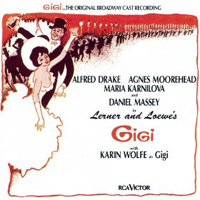 Original Broadway Cast, 1973 (RCA)
Original Broadway Cast, 1973 (RCA)  (2 / 5) Here’s the cast album of a stage production that came 15 years after the film Gigi. The world had changed so much in the interim that the show seemed antiquated, aside from the flaws of the adaptation itself. The new orchestrations sound opaque and soporific; the production apparently had a kitschy, 1970-ish operetta look, and this album reflects that ill-advised concept, although some of the performances sparkle. Maria Karnilova sounds charming as Grandmama, Agnes Moorehead must have been riveting as the tough-as-nails ex-courtesan Aunt Alicia, and Daniel Massey is well cast as Gaston. Yet only Alfred Drake as Honoré seems fully at ease and in his element. Amazingly, he is able to dispel the ghost of Chevalier’s performance and offer a fresh characterization. While “Thank Heaven for Little Girls” will always conjure memories of Chevalier, Drake’s other numbers — including “I’m Glad I’m Not Young Anymore” and “Paris Is Paris Again,” the latter written specifically for the stage version — are highlights of the recording. The major drawback is the tepid title-role performance of Karin Wolfe, who displays none of the pluck and intelligence that are essential elements of Gigi’s character. — G.A.
(2 / 5) Here’s the cast album of a stage production that came 15 years after the film Gigi. The world had changed so much in the interim that the show seemed antiquated, aside from the flaws of the adaptation itself. The new orchestrations sound opaque and soporific; the production apparently had a kitschy, 1970-ish operetta look, and this album reflects that ill-advised concept, although some of the performances sparkle. Maria Karnilova sounds charming as Grandmama, Agnes Moorehead must have been riveting as the tough-as-nails ex-courtesan Aunt Alicia, and Daniel Massey is well cast as Gaston. Yet only Alfred Drake as Honoré seems fully at ease and in his element. Amazingly, he is able to dispel the ghost of Chevalier’s performance and offer a fresh characterization. While “Thank Heaven for Little Girls” will always conjure memories of Chevalier, Drake’s other numbers — including “I’m Glad I’m Not Young Anymore” and “Paris Is Paris Again,” the latter written specifically for the stage version — are highlights of the recording. The major drawback is the tepid title-role performance of Karin Wolfe, who displays none of the pluck and intelligence that are essential elements of Gigi’s character. — G.A.
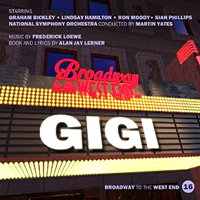 London Studio Cast, 1997 (JAY)
London Studio Cast, 1997 (JAY)  (3 / 5) This well-done digital recording features Ron Moody (of Oliver!) fame as Honoré and the distinguished actress Sián Phillips as Mamita. Graham Bickley sings very well and gives an intelligent and vibrant performance as Gaston, while Lindsay Hamilton is quite charming as Gigi. It’s clear by everyone’s interpretation that this is still essentially a young women’s coming of age story. Moody’s vocal performance certainly leaves something to be desired, but all of the other music is well interpreted and performed. Several numbers are missing from the score of the 1973 Broadway stage version, including “The Earth And Other Minor Things,” “I Never Want To Go Home Again,” and “The Contract, ” but all of the more familiar songs from the movie are included, and the large orchestra sounds excellent playing what sound like the 1973 orchestrations enlarged a bit and with touches of the film orchestrations added here and there. All in all, the results are quite pleasant and lovely. — G.A.
(3 / 5) This well-done digital recording features Ron Moody (of Oliver!) fame as Honoré and the distinguished actress Sián Phillips as Mamita. Graham Bickley sings very well and gives an intelligent and vibrant performance as Gaston, while Lindsay Hamilton is quite charming as Gigi. It’s clear by everyone’s interpretation that this is still essentially a young women’s coming of age story. Moody’s vocal performance certainly leaves something to be desired, but all of the other music is well interpreted and performed. Several numbers are missing from the score of the 1973 Broadway stage version, including “The Earth And Other Minor Things,” “I Never Want To Go Home Again,” and “The Contract, ” but all of the more familiar songs from the movie are included, and the large orchestra sounds excellent playing what sound like the 1973 orchestrations enlarged a bit and with touches of the film orchestrations added here and there. All in all, the results are quite pleasant and lovely. — G.A.
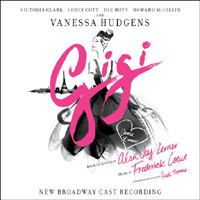 Broadway Cast, 2015 (DMI)
Broadway Cast, 2015 (DMI)  (1 / 5) If you are looking for a good, new recording of the classic Lerner & Loewe score for Gigi, this isn’t it. In fact, what’s presented here is hardly recognizable as Gigi at all; lyrics have been added, deleted, or changed, seemingly arbitrarily, by an uncredited lyricist, and much of the music is poorly arranged and orchestrated. The more experienced performers — Dee Hoty, Victoria Clark, and Howard McGillin — come off well, but Vanessa Hudgens as Gigi and Corey Cott as Gaston are miscast vocally, and they are not playing the characters as created by Colette and adapted by Alan Jay Lerner. Hudgens’ Gigi is bratty and overbearing; Cott has a pleasant singing voice, but he sounds too young and sweet for the role, and his performance is devoid of contrasting emotions. Most disastrous to this recording are the new and altered lyrics. Whoever did the rewrites chose to eliminate Gaston LaChaille’s problem of perpetual ennui by changing “It’s a Bore” to “It’s NOT a Bore.” Mis-scansion aside, the excision of this facet of the character means there isn’t much for Gaston to overcome. Reassigning “Thank Heaven for Little Girls” to Mamita and Aunt Alicia seems a rational choice for the modern age, but changing Gigi’s solo “Say a Prayer for Me Tonight” to Mamita’s “Say a Prayer for Her Tonight” throws the heroine’s dilemma completely off balance. Perhaps this was done to pad Victoria Clark’s role, but the new lines in the lyrics hardly have the good taste and polish of Lerner’s original version, and they fall awkwardly on what’s left of Loewe’s music. It’s arguable that Gigi needed a fresh approach to appeal to modern sensibilities, but almost every choice here makes you wonder why the producers even bothered to revive (or revise) this musical, rather than creating a new one. If Gigi can’t be successfully presented for a contemporary audience as written by Lerner and Lowe, better to have left it alone and allowed it to live on in the form of the beautiful film version. — G.A.
(1 / 5) If you are looking for a good, new recording of the classic Lerner & Loewe score for Gigi, this isn’t it. In fact, what’s presented here is hardly recognizable as Gigi at all; lyrics have been added, deleted, or changed, seemingly arbitrarily, by an uncredited lyricist, and much of the music is poorly arranged and orchestrated. The more experienced performers — Dee Hoty, Victoria Clark, and Howard McGillin — come off well, but Vanessa Hudgens as Gigi and Corey Cott as Gaston are miscast vocally, and they are not playing the characters as created by Colette and adapted by Alan Jay Lerner. Hudgens’ Gigi is bratty and overbearing; Cott has a pleasant singing voice, but he sounds too young and sweet for the role, and his performance is devoid of contrasting emotions. Most disastrous to this recording are the new and altered lyrics. Whoever did the rewrites chose to eliminate Gaston LaChaille’s problem of perpetual ennui by changing “It’s a Bore” to “It’s NOT a Bore.” Mis-scansion aside, the excision of this facet of the character means there isn’t much for Gaston to overcome. Reassigning “Thank Heaven for Little Girls” to Mamita and Aunt Alicia seems a rational choice for the modern age, but changing Gigi’s solo “Say a Prayer for Me Tonight” to Mamita’s “Say a Prayer for Her Tonight” throws the heroine’s dilemma completely off balance. Perhaps this was done to pad Victoria Clark’s role, but the new lines in the lyrics hardly have the good taste and polish of Lerner’s original version, and they fall awkwardly on what’s left of Loewe’s music. It’s arguable that Gigi needed a fresh approach to appeal to modern sensibilities, but almost every choice here makes you wonder why the producers even bothered to revive (or revise) this musical, rather than creating a new one. If Gigi can’t be successfully presented for a contemporary audience as written by Lerner and Lowe, better to have left it alone and allowed it to live on in the form of the beautiful film version. — G.A.

